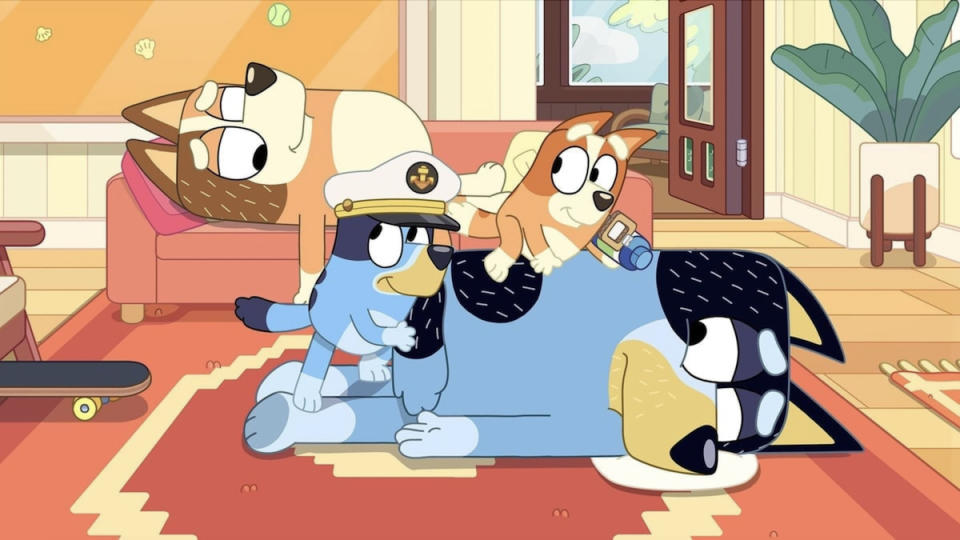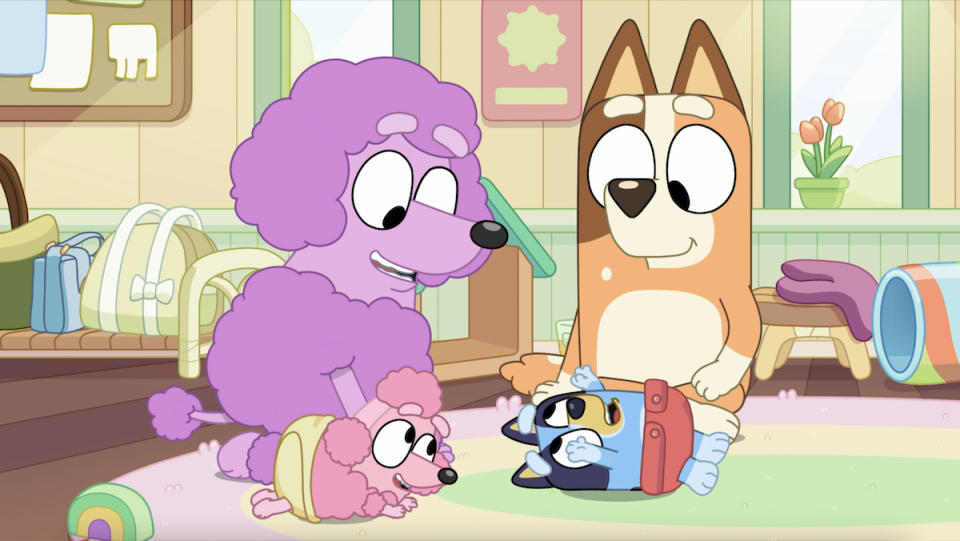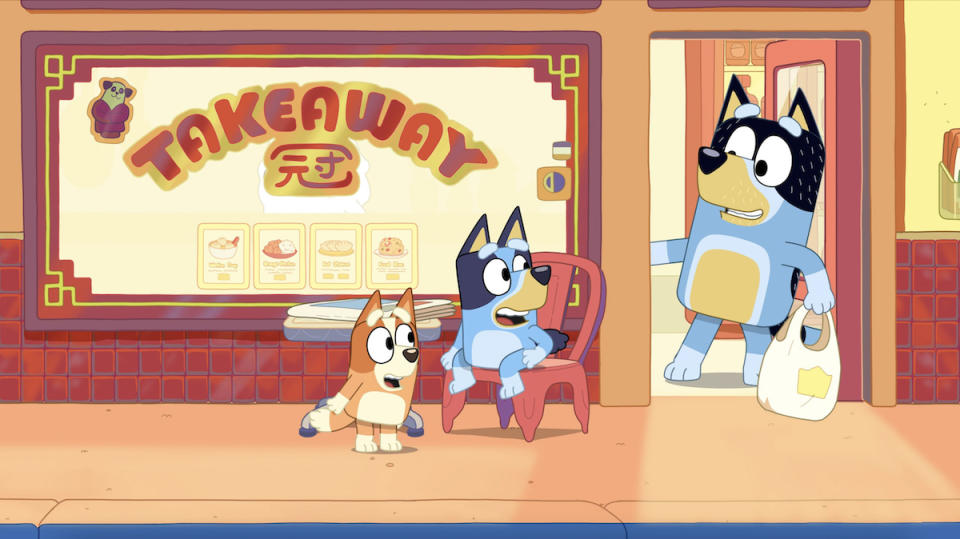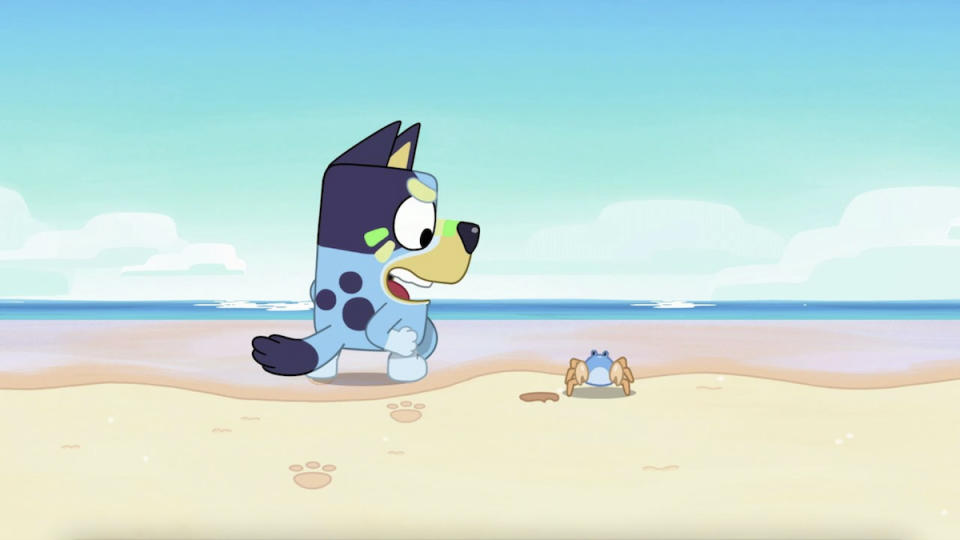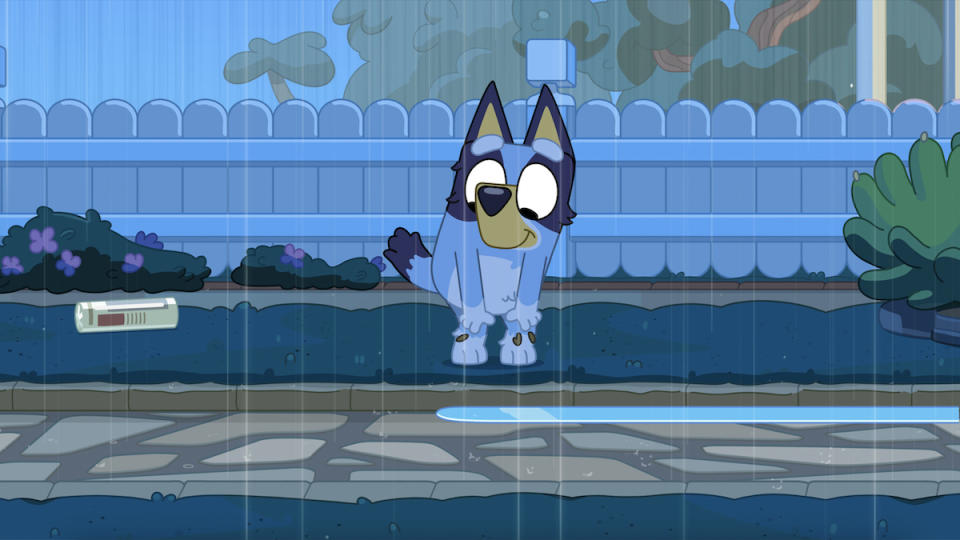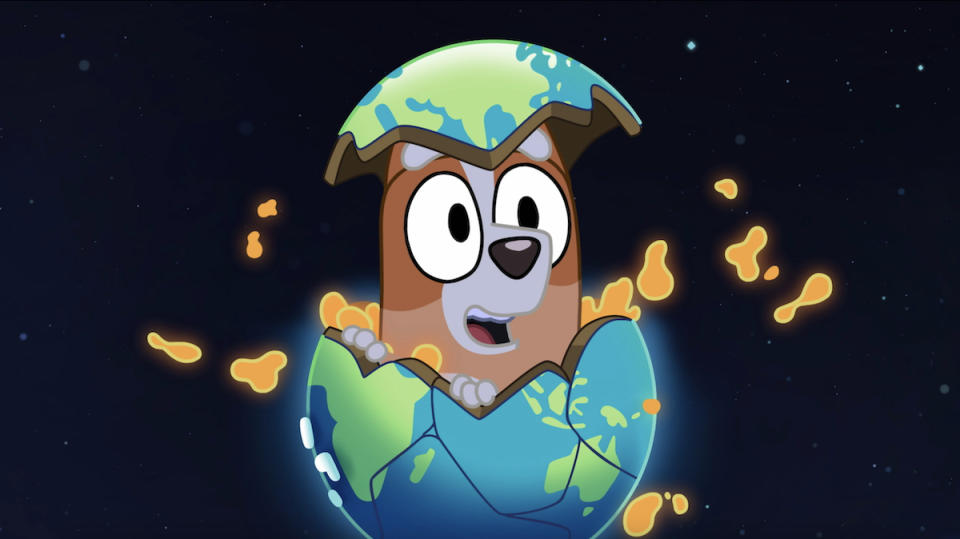An Exhausted Parent Ranks All 154 Bluey Episodes from Worst to Best
The post An Exhausted Parent Ranks All 154 Bluey Episodes from Worst to Best appeared first on Consequence.
Bluey charms everyone from toddlers to 10-year-olds, stoned college students to parents and grandparents. Creator Joe Brumm’s innovation is that a kids’ show can also be a perfectly adult sitcom, with creative storylines aimed squarely at mom and dad. Bluey and Bingo’s parents, Bandit and Chilli Heeler, can be great role models, true; they can also be exhausted, hungover, stressed about everything, and ready to cry.
Us, too. Add in jaw-dropping animation and wonderful music from a team led by Joff Bush, and Bluey might be the first great work of art that entertains young kids. Few adults stayed up past their children’s bedtime watching Mister Rogers or Arthur, but Bluey is almost as popular with older generations. That’s why, in an age of content overload, Bluey traveled so far from its beginnings on the Australian Broadcasting Corporation, past streaming dominance on Disney+ to becoming a worldwide, all-ages phenomenon.
Below, I’ve done my best to rank every episode from worst to best. But worst is definitely relative, and even No. 154 is still better than a single minute of Cocomelon. I’ll explain why I enjoy some episodes more or less, but none of them are bad. Above all, this list is a love letter to a show that made everyone in my family feel seen.
Editor’s Note: If you’ve got a little tike who also enjoys Bluey, both of you may enjoy Consequence’s new children’s merch. Check out the full collection at the Consequence Shop.
154. “Magic” (Season 3, Episode 114)
The episode called “Magic” has probably the least imaginative wizardry of any episode in Bluey. It’s just a Stars Wars Force push for the whole six minutes, and it doesn’t get put to more creative use than briefly forcing Bandit and Lucky’s Dad to dance. Besides that, Chilli’s proclamation that magic is “stronger in some than others” feels uncharacteristically elitist, and contradictis the message of other, better episodes.
153. “Backpackers” (Season 1, Episode 36)
The premise is nice, but backpacking turns out to be little more than a series of dull conversations with garden gnomes while toddlers punch Bandit in the stomach — a repetitive physical joke that doesn’t quite land. Even cousins Muffin and Socks can’t imbue this travel game with a sense of adventure.
152. “Shaun” (Season 1, Episode 50)
There are practical reasons why Brumm wouldn’t want to introduce a pet into the Heeler dynamic: It’s a big commitment to a recurring side-character, and dogs owning other animals may introduce uncomfortable questions. But in “Shaun” Bandit acts unlike himself and dismisses his kids when they ask for a pet. In other episodes, Dad gets called out for not taking the pups seriously, but “Shaun” gives him a pass when he pretends his hand is an emu. Shaun’s naughtiness anticipates other characters that Bandit’s hand will play, but the emu is the most one-dimensional.
Age Verification
Are you 18 years of age or older ?
Buy Now from Consequence Shop
151. “Pirates” (Season 1, Episode 27)
Some of the most memorable Bluey episodes feature side characters taking center stage, but “Pirates” isn’t one of them. Missy doesn’t bring much to the Heeler dynamic and may actually subtract, by taking screen time and plot points away from Bingo. Luckily, Chilli spends part of the episode roasting Bandit for how his whale seems to get so much shyer when other daddy whales are around. It’s a test of his bravery — and hypocrisy — and he passes both.
150. “Bob Bilby” (Season 1, Episode 12)
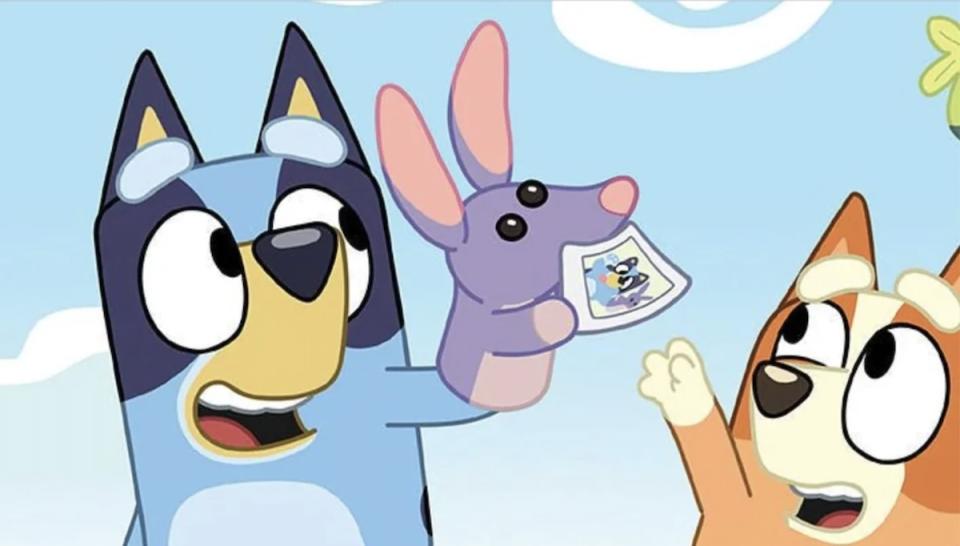
It’s not actively annoying, but “Bob Bilby,” about a hand-puppet from Bingo’s class, doesn’t offer much in the way of humor or emotional resonance. The first section, with too much screen time for the kids, is as much fun for us as it is for Bob, though things pick up once the pups decide to show the puppet a good time. It’s just hard to get invested in whether or not this particular toy feels welcome or entertained — though that will change in later episodes with a very different puppet.
149. “The Doctor” (Season 1, Episode 18)
This forgettable episode is set in a waiting room and comes with a muddy moral message — the squeaky wheel gets the grease but also be yourself? Perhaps the biggest problem is that it’s centered on Honey, a likable side character without enough personality to carry the story. After all, the whole problem is that she isn’t imaginative enough to interest Dr. Bingo! Brumm gives Honey a try out here, but after this wayward star turn she returns to the background.
148. “Barky Boats” (Season 1, Episode 83)
“Barky Boats” is pretty clear that someday, Bluey and Mackenzie are going to fall in love just like their big-school pals, Mia and Captain. Some viewers might hate this because Bluey and Mackenzie are kids who should be allowed to grow up, and some might hate this because their imaginations are lingering over the “Camping” flash-forward with Jean-Luc. Despite it’s importance to “Surprise,” I’m not the biggest fan of “Barky Boats” mainly because I don’t find Mia or Captain to be interesting characters who reveal much about the main cast. In “Double Babysitter,” and in the relationship of Indy and Rusty, Bluey does a much better job of quickly investing us in a fledgling romance.
Age Verification
Are you 18 years of age or older ?
Buy Now from Consequence Shop
147. “Tickle Crabs” (Season 1, Episode 72)
My oldest likes “Tickle Crabs” more than I do, but he did not get a vote in this ranking. Apart from some brief conversations with seagull Chilli, which seem to suggest that Bandit had recently been asking for more than his fair share of relationship support, there just isn’t much here to keep the grownups interested.
146. “Circus” (Season 2, Episode 85)
Bingo standing up to a bully? Good stuff. Winton as a mouth-farting clown? Even better. But for the most part, this meandering allegory about democracy gets mixed up between the circus game and the broader political dynamics Brumm is trying to explore, with the result that neither feels very satisfying. Brumm’s views on balancing freedom with societal discord come through with more clarity and humor in episodes like “Neighbours” and “Swim School.”
145. “Exercise” (Season 3, Episode 143)
Before it was cut, the openings scene depicted Bandit standing on the scale and fretting in front of a mirror, though this scene was removed amid concerns about fatphobia. Without it, “Exercise” feels low-stakes, but no matter what it would’ve landed as repetitive, with each Bandit collapse becoming more predictable. Despite some good gags, it feels like what it is: an oddly edited, incomplete draft.
144. “Mr. Monkeyjocks” (Season 1, Episode 90)
The single whiniest episode in all of Bluey. The setup of a “special” toy taking over the house has some nice moments — watching Bandit pushed to breaking is always a good time, and the moment at the end when Mr. Monkeyjocks finds a loving home is genuinely sweet. But the vast majority of the dialogue is someone complaining about something, and thank you, but I get enough of that at home.
143. “Space” (Season 3, Episode 138)
Mackenzie was the wrong character to tell this story, or Brumm needed to introduce some uncomfortable elements into Mackenzie’s childhood. But when the young Border Collie ventures into the black hole — and soon after, his memories — the emotional stakes don’t match what happened. It’s implied that he has real baggage, perhaps even trauma, from getting turned around in a mall slide and briefly losing track of his mom. There are a lot of cool elements — Jack and Rusty are always a good time — but the answer to Mackenzie’s mystery is a little disappointing and doesn’t make much sense.
142. “Squash” (Season 2, Episode 56)
This episode has a fun setup with two sibling rivalries, plus a lively game-of-the-week: Bluey and Bingo “control” Bandit and Stripe in a squash match. But the moral — that little sisters can beat be big sisters — gets overshadowed with weak conflict resolution. The team of Stripe and Bingo don’t win fairly; Bluey throws the match. That might make her a nicer sister, but it undercuts the underdog message “Squash” is trying to sell.
141. “Spy Game” (Season 1, Episode 13)
As Bandit grills, Bluey is so wrapped up in the game that she doesn’t listen to Bingo, who sulks yadda yadda yadda. Quietly, Bingo is underwritten at the beginning of the series, and “Spy Game” is her 5th sulk in the first 13 episodes. This one is enlivened with a bit of bathroom humor, and the guards whose only weapon is volume are certainly worth a smile. But Bluey got a lot more varied as Brumm developed Bingo’s personality.
140. “Blue Mountains” (Season 1, Episode 21)
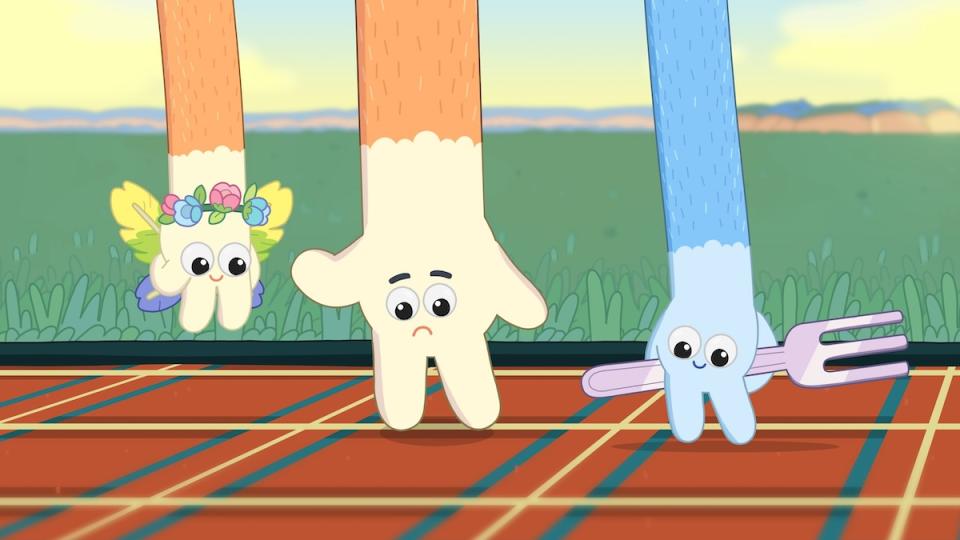
Imaginative artwork, including some of the longest forearms you’ll ever see, elevate what is otherwise a pretty pedestrian fantasy tale. Bluey would bring a lot more complexity to “what-ifs” later, while also pushing the artwork further, and so the more of Bluey you’ve seen, the less impressive “Blue Mountains” becomes.
139. “Mount Mumandad” (Season 1, Episode 44)
Climbing Mount Mumandad while the exhausted parents rest, Bluey is too fast and reckless, Bingo too slow and plodding. Somehow, they must find harmony before they can reach the summit. On the plus side, I’m always looking for more games I can play lying down, though as to the minuses, there isn’t much humor or depth.
138. “Dunny” (Season 2, Episode 100)
Hey, American trying to translate Aussie for other Americans here: Dunny is short for “dung heap,” and feels less outré than “crapper.” But parents everywhere can understood what it’s like when a kid tests boundaries around language. For an episode about toilets there are fewer jokes than you might expect, and as for the plain bedroom animation, it probably saved the animation team a lot of time before the wild run (“Baby Race!” “Easter!”) that ended Season 2.
137. “Piggyback” (Season 2, Episode 70)
Bingo spends half the episode whining, which will always limit an episode’s rewatchability, and there aren’t a lot of quips for parents. But holy cow is that art stunning — a dazzling side scroll of beauty along the water.
136. “Postman” (Season 2, Episode 88)
After seeing her parents squabble, Bluey enlists Bingo to bring them back together, in the process speed-running through a whole relationships’ worth of strategies to avoid squabbling themselves. Adult viewers will recognize early that what Bluey calls “squabbling” is a normal part of conflict resolution, and so the experience of watching “Postman” is mostly following the pups play floor is lava and waiting for them to figure it out, too.
135. “Show and Tell” (Season 3, Episode 146)
The best moment in “Show and Tell” comes early, when an exasperated Bandit can’t believe the children once again need to learn to listen to their parents. He even references the imaginary friend of a previous episode, “Tina,” which the kids indignantly say they don’t remember. The lesson in the car isn’t quite as much fun as Tina was, but if your own pups are anything like mine, “Show and Tell” is worth watching until to the end just to see someone enthusiastically obeying their parents.
134. “Ice Cream” (Season 2, Episode 99)
This is a Bluey-Bingo squabbling episode, but on the plus side, a lot of their fight takes place within a dance sequence set to Tchaikovsky’s “Waltz of the Flowers.” Muffin’s cameo in the gift shop is fun, and the gorgeous, waltzing choreography serves as a nice reset for our hectic lives, like a mini version of “Rain.”
133. “Rug Island” (Season 2, Episode 62)
By Season 2, almost every game in Bluey works on a deeper level. “Rug Island” does not, though it still offers a little taste of tropical delights. The Heelers have creative fun with the pens, and the Robinson Crusoe make-believe is never less than amusing. “Rug Island” is also notable as perhaps the only lackluster appearance from Lucky’s Dad.
132. “Zoo” (Season 1, Episode 35)
Bandit — sorry, that’s “Ooh-Ooh” — is an ape who kidnaps and later charms Snowdrop, played by Bingo. There are a few good gags, though the in-game relationship between Snowdrop and Ooh-Ooh never feels particularly high stakes, in part because it’s so much more shallow than their father-daughter bond explored in other episodes.
131. “Queens” (Season 2, Episode 75)
A fun subversion of a classic problem: No one wants to play queen and everyone wants to play butler. The girls’ alternating reigns are initially charming, though we may get bored as they do. Bandit’s rule is sidesplitting but short, and when Chilli takes her place on the throne, there’s a feeling that all is right with the kingdom.
130. “Seesaw” (Season 2, Episode 80)
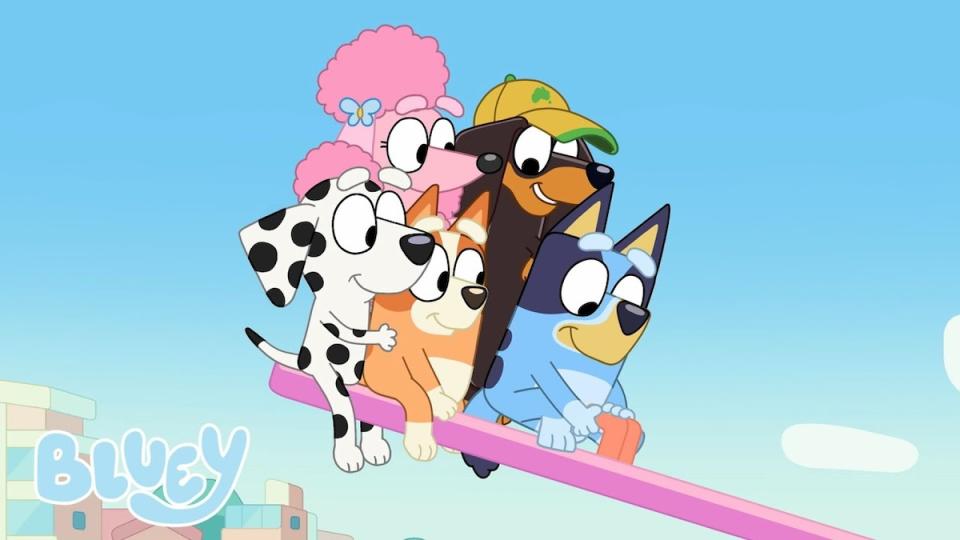
Adults are likely to see every beat in the plot coming from miles away. But the lesson that size doesn’t matter is an important one, and it’s still fun to experience Bandit in full villain mode, stroking his pet rock like an even-more evil genius might stroke a fluffy cat. “Pomeranians are a small but hardy breed” turns out to be a surprisingly good rallying cry.
129. “Housework” (Season 3, Episode 117)
Monty Python’s “The Ministry of Silly Walks”: Bluey edition. Bluey and Bingo trot out a wild variety of steps while doing chores, which Mum and Dad find both bemusing and inspirational. There isn’t much else going on, though if you and your own pups feel like following in the episode’s footsteps, so to speak, “Housework” can be a hopping good time.
128. “Hairdressers” “Nits” (Season 2, Episode 57)
The transition from “This episode of Bluey is called ‘Hairdressers'” to “This episode of Bluey is called ‘Nits,'” is even more satisfying than Bluey finding her ears and Bingo finding her voice. After the nits appear, most of the gags are physically painful for Bandit in a way that grows one-dimensional, but on the bright side, we do get to meet Dad’s most pompous alter ego, Burt Handsome.
127. “Kids” (Season 1, Episode 45)
For children, this grocery store tale has the fantasy of swapping roles with mom and dad, plus a moral lesson of why it’s important to not play favorites. For adult viewers, most of whom presumably love their children equally, the main pleasures here are Bandit’s escalating humiliations, especially the timeout in the toilet paper.
126. “Pavlova” (Season 3, Episode 121)
This an episode-length ode to “playing the long game,” as Bandit puts it, and while he’s talking about board games, Brumm has set his sights on healthy eating. Bluey and Bingo are using their parent’s gentlest parenting tendencies to test boundaries around dessert before dinner, and so Dad dives right into the game as an inept chef speaking highly-questionable French. In the world of Bluey and perhaps at your dinner table, too, persistence without pushiness often pays off.
125. “Hospital” (Season 1, Episode 2)
The second-ever episode introduces the dynamic that makes Bluey such fun: The kids play an imaginative game, while the parents star in a family sitcom about the difficulties of childrearing. Bandit is too tired to move, so he lies down and pretends to be sick. Sure the needles aren’t comfortable, but Bingo and Bluey have a blast. Your own pups can laugh at the slapstick while parents laugh in recognition — we’ve all been there.
124. “The Decider” (Season 3, Episode 141)
Airing during a real-life match between the Queensland Maroons and the New South Wales Blues, “The Decider” follows drama in the Labrador household while Lucky’s younger brother, Chucky, decides whether to root for his dad’s team or his mom’s. Brumm is a clear sports fan, and his celebrations of victory are cut with glances to despair in the other rooting section. Alongside Bluey, Chucky measures which side “has the most dancing,” a cute nod to the way children are drawn to favorites over underdogs. So when Chucky decides to back the Maroons, his walk away from his mom is cuttingly sad. It’s all setting up for the unifying family hug during an Australian national team game, while an announcer intones, “That’s what it’s all about.”
123. “Fairies” (Season 1, Episode 30)
30 episodes in, and we finally get some evidence that Bandit has a job (canonically, he’s an archeologist). However, his phoned insistence that he only needs “Four, not five” of something (bones, I guess?) hurts Bingo’s feelings, and by a huge coincidence (!) fairies take up residence in the Heeler house. Bandit’s fae penance is pretty fun, and while the show validates Bingo’s feelings, it never makes Dad out to be a villain for doing his job. This is also an important moment in Bingo’s early character development, as her habit of sulking finds more imaginative expression.
122. “Tina” (Season 3, Episode 125)
Bluey and Bingo’s imaginary friend, Tina, is strong enough to turn Mum and Dad into servants. This episode is a bit heavy on moralizing, especially in a surprisingly long conversation at the end where kids and adults promise to approach chores differently. But “Tina” features a killer comedic run that’s capped off by the stinky girls grossing each other out.
121. “Work” (Season 1, Episode 31)
Right after “Fairies” confirmed Bandit does have employment, “Work” shows us another side of the job force: child labor. “I’m sure I won’t regret this,” Bandit deadpans after Bluey informs him they’re playing work. Here Bluey becomes the villainous boss, and Bandit the beleaguered office drone. The story progression is absurd, like Calvinball meets Kafka, culminating in an explosion of dance. Especially in an episode about office life, it’s hard not to appreciate the creativity.
120 and 119. “Library” (Season 2, Episode 82) and “Muffin Cone” (Season 2, Episode 95)
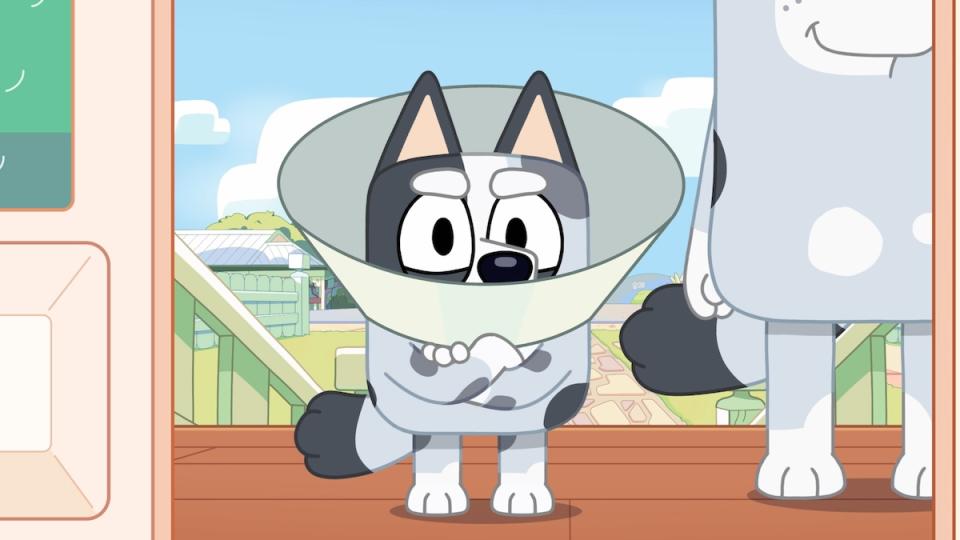
Season 2 has a pair of loosely-linked episodes in which Uncle Stripe and Aunt Trixie make parenting mistakes with their oldest child, Muffin. “Muffin Cone” is better than “Library,” but because of their thematic similarities, it makes sense to average their rankings and talk about them together.
In “Library,” Stripe tells Muffin that she’s “special” while driving over to Bluey and Bingo’s house. Then the hyperactive toddler goes mad with playtime power. By Muffin’s usual standards, the hijinks are tame, at times verging on mean. But when Stripe realizes the effect his words have had on his daughter, he gently offers a correction. Her cry of “I’m not special!” and the chorus of “Hurray!” is a blast.
Just a few weeks later the Heeler cousins returned in “Muffin Cone,” which mirrors “Library” right from the jump with Muffin in the car. This time it’s Trixie driving, and the problem is Muffin’s thumb-sucking. Well, “problem,” is probably not right –this isn’t made explicit, but Muffin was just starting to skip naps last season, and Trixie’s own behavior later in “Muffin Cone” suggests she’s picking this battle earlier than necessary.
For the girls, the cone ruins their first game but spurs their creativity. For Trixie, a bowl of chips reminds her that the self-control she’s demanding of Muffin isn’t easy, even for adults. In both “Library” and “Muffin Cone,” the children are called upon to practice patience while the parents learn a lesson.
118. “Bad Mood” (Season 2, Episode 92)
Bingo’s game is even more carefully tied to the physiological experience of having a bad mood than it may at first appear: The Bad Mood (played by Bandit) distracts her from things she would usually enjoy; Bingo fights to stay in it; and after a few minutes of exercise the Mood is too tired to carry on. With these subtleties, “Bad Mood” rewards repeat viewings.
117. “Christmas Swim” (Season 2, Episode 103)
Bluey thinks her family is too rough with her new toy, Bartleby. But this main story isn’t quite as interesting as the rest of the Christmas mayhem, especially Bandit and Stripe’s loving rivalry and Muffin doing anything. “Christmas Swim” would almost be an afterthought, except for one brief video call when Bluey’s godmother Frisky confirms from Rad’s pool that she’s now a part of the Heeler family.
116. “Cubby” (Season 3, Episode 142)
The moral — that bigger isn’t always better — is a bit subtle for kids who don’t often get to make those choices, while it’s telegraphed pretty early for adults in the audience. But that’s a small complaint when the quips are this amusing or the art this fabulous: Bandit’s Quixotic quest for the bathroom through the interior of the blanket-house is as jaw-dropping as anything in the series.
115. “Swim School” (Season 2, Episode 86)
If the gorgeous background views don’t give it away, Chilli is reading a guidebook on Bali. The Heeler family vacation includes lounging by the pool, where Bluey adopts the personas of Karen and Margaret to give swimming lessons. Here dobbing (that’s ‘snitching’ for those of us in the US) serves as a stand-in for trust. Karen’s free and trusting structure is harmonious, while Margaret’s insistence on turning the Heelers into dobber-menn makes cooperation impossible. Brumm’s approach is closer to philosophy than politics, and here and in episodes like “Neighbours” and “Circus,” he lays out a worldview where kids and adults should be left alone to solve problems themselves — “Unless someone’s in danger,” as Chilli is quick to point out.
114. “The Show” (Season 2, Episode 71)
“The show must go on” in a Mother’s Day story that tests Bingo’s tenacity. We learn a bit about how Chilli and Bandit met (though they may disagree), and the show-within-a-show format is fertile ground for comedy. It’s hard not to “Aww” alongside Chilli. “The Show” is not the most ambitious episode, but it’s a good time.
113. “Wild Girls” (Season 3, Episode 148)
That deep bench of side characters really shines in “Wild Girls,” a chance for all of Bluey’s various sidekicks to be the hero without her. The poodle Coco, who was inflexible about games as far back as “Shadowlands,” is pushing hippie Indy to play a totally static version of the wild girls game. Chloe, Bluey’s dalmation buddy in “The Adventure,” quickly gets on Bluey’s level, abandoning the boring games as soon as it’s convenient. Like in “Mums and Dads,” Indy’s devotion to playing at first gets in the way of having fun, but as she learns from Calypso, “Games can change.” Those same words allow Coco to both play wild girls and become the fearsome pink witch — to everyone’s benefit. It’s not stunning the way some episodes are, but “Wild Girls” is satisfying in how it ties earlier character arcs together.
112. “Ragdoll” (Season 3, Episode 129)
Of all the classic conflicts in Bluey, perhaps none is more relatable than Bandit trying to impart a lesson to kids refusing to learn. “Hang on, are you trying to teach us something?” Bluey demands halfway through “Ragdoll.” “We’re not learning anything. Got it?” But learn she does, including “Work smarter, not harder,” one of many adages Bandit spouts as he lies limp on the floor. They also see “what ten years of Pilates can do,” when neighbor Wendy hoists Bandit into the car, and finally, that ice cream really does taste great. “Ragdoll” has solid chuckles throughout.
111. “Smoochy Kiss” (Season 3, Episode 139)
“Ok, I promise, no more disgusting things,” Bandit lies, before continuing to be himself. “Smoochy Kiss” centers Bandit and Chilli’s romance, while keeping the jokes firmly at Bandit’s expense. Chilli’s stealthy box seems to be a Metal Gear Solid reference, Bandit peeing on himself is laugh-out-loud funny, and when Mum finally reaches Dad, the pup’s engineer an “Escape”-style reversal, switching the chaser and chased. “Smoochy Kiss” is gross, but as the lovers remind their pups, so is true love.
110. “The Pool” (Season 1, Episode 22)
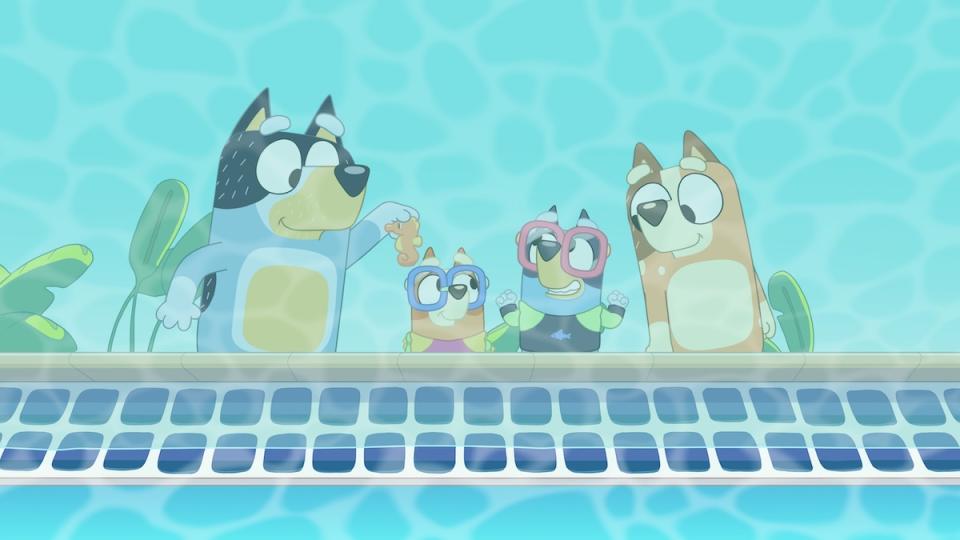
Chilli always remembers the pups’ stuff, which will come back to bite Dad and the kids when Mum stays home from a trip to the pool. Your enjoyment of this episode may vary based on the health of your marriage. In its exploration of invisible labor, “The Pool” comes off as a less-funny “BBQ,” and its feminist message doesn’t reach the slapstick heights of “Dad Baby.” Instead, we spend a lot of time listening to the kids complain. Still, the moment at the end when Mom is proved right is wonderfully satisfying.
109. “Explorers” (Season 2, Episode 119)
Other Jack episodes focus on his friendship with Rusty or his experiences with neurodivergence, but in “Explorers” we see a bit more about his family. While Jack plays explorers journeying back from Antartica to Australia, the sat-nav dies in his Dad’s car, and he gets lost on the way to preschool pickup. The adult plot dominates the exploring, and we don’t learn much about Jack, but his father’s encounters with foreign backpackers and conspiracy loon Maynard (last seen in “Grandad”) make this particular journey worth traveling.
108. “Yoga Ball” (Season 1, Episode 16)
Lots of Bluey episodes have messages for the kids, but “Yoga Ball” is aimed squarely at the parents. Here, Bandit has gotten used to playing with his oldest, Bluey, and his treatment of Bingo is too rough. Chilli teaches Bingo to use her “big girl bark,” and Bandit models listening for the moms and dads in the audience. It can lean a bit preachy, but in her secondary role, Bluey causes enough bouncing chaos to keep things humming along.
107. “Magic Xylophone” (Season 1, Episode 1)
The pilot that launched a global phenomenon also did a solid job laying out the Bluey ground rules. Is there magic? Yes, kind of. But did you notice later in the episode how a panicky Bingo runs away even after Bandit chimes the magic xylophone to make her freeze? The fantasies in Bluey can be ignored if either kids or parents need to, but just because it’s make-believe doesn’t mean it isn’t real.
106. “Daddy Putdown” (Season 1, Episode 51)
Most of “Daddy Putdown” sees Bandit trying to help Bluey manage her sadness at missing her mum while Chilli enjoys just a few hours without her children, just a few, is that too much to ask? attends a baby shower. Games distract Bluey, but never for long. What finally helps is talking through her feelings before processing them in a baby shower game — one of many examples in Bluey of games as emotional management. “Daddy Putdown” is a fairly realistic slice-of-life, with all the comforts of handling a tough situation well.
105. “Musical Statues” (Season 3, Episode 131)
AKA the episode where half the audience belatedly realized what’s happening during opening credits. Something else you may have missed the first time around: Chilli saying “I see where she gets it,” when Bluey and Bandit act grouchy is just the most obvious parallel between father and daughter. “Musical Statues” captures an antsy mood “when you know you want something” but you don’t know what. The music from Joff Bush, Lachlan Nicolson, and Steve Peach just makes it even better.
104. “Daddy Robot” (Season 1, Episode 4)
Later on, Bluey proudly insists that she will “Not learn any lessons.” But during Season 1 Brumm was still finding his voice as a writer, and so when the pups learn to clean up their own messes in “Daddy Robot,” the resolution is as tidy as a sermon. It’s still fun, but it’s also a glimpse at an alternate universe with a less-cheeky version of the show, in which morality could trump the game. But on the bright side, “Daddy Robot” does a ripping job introducing the romance between Mum and Dad, which goes on to become one of the show’s most powerful themes.
103. “Mum School” (Season 2, Episode 66)
If you wanted, you could credit the balloon Greeny as Bluey‘s first abstract depiction of special needs, because Bluey’s game of mum school is mostly about accommodating Greeny’s differences. But fan-favorite Jack is going to join the army in just a few episodes, so instead let’s celebrate the comic framing, which sees Chilli following Bluey with a clipboard, offering coaching and quips.
102. “Verandah Santa” (Season 1, Episode 52)
The first half of “Verandah Santa” is played for laughs, as Bluey desperately tries to impress Santa (located vaguely in the sky) with good behavior. The second half is concerned with ethics around guilt after the 1-year-old Socks bites Bluey. Bluey’s feelings are hurt worse than her arm, but she uses the idea of Santa to punish Socks, as the holiday episode teeters on satirizing organized religion. In the end, Bluey understands the difference between seeming good and being kind, and everyone gets presents.
101. “Slide” (Season 3, Episode 150)
After “Daddy Dropoff” revealed a lifetime of companionship between Bingo and Lila, “Slide” shows their friendship in smooth, gliding motion. The mutual concern for the little bugs binds them together, while the POV animations will have younger viewers squealing. Sharp-eyed audiences will also recognize plenty of insects from other episodes, but the bugs are cool on their own; the charms of “Slide” are in its simplicity.
100. “Hide and Seek” (Season 1, Episode 42)
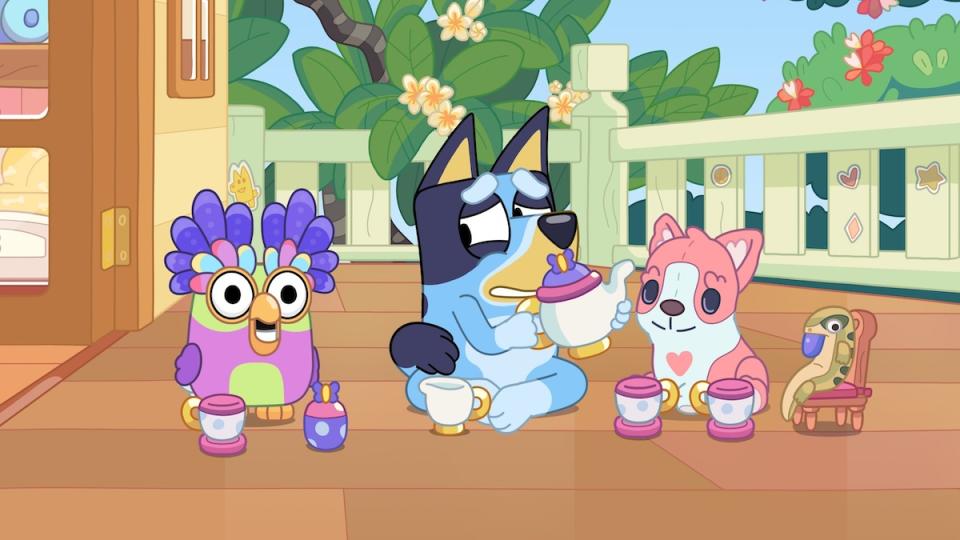
Chattermax is a hilarious satire of the worst kind of children’s toys, and while the flashing, babbling demon will never get significant screen time again, it becomes a recurring prop in later episodes. The game of hide and seek has some solid jokes and the zen message is a nice idea, though my children are unfortunately immune.
99. “Phones” (Season 3, Episode 120)
“Gee that internet thing has really taken off, hasn’t it?” Chilli’s Dad muses, standing on an overly “busy” street with one moving car. Some things change, but one that hasn’t is how much the different generations can learn from each other. As Bluey and Bingo play restaurant delivery with Grandad Mort, he picks up on some nuances of phone technology. At the same time, his reptilian twist (bless you, Lucky’s Dad!) teaches the pups that the value of apps is in how they keep people connected.
98. “Butterflies” (Season 1, Episode 15)
Later Brumm sanded down some of Judo’s rougher edges, but in her introduction the Chow Chow is so so much much. As Bingo puts it, Judo is “bossy,” but that bossiness quickly escalates to bullying. When Bluey joins in, “Butterflies” shows us a different sides of the title heroine, who before now had ignored Bingo but never treated her cruelly. The way Bluey hurts the people she loves and struggles to apologize is part of what makes this magical show feel real.
97. “Bike” (Season 1, Episode 11)
A frustrated Bluey is ready to give up learning to ride a bike, until she notices so many of her peers struggling with obstacles of their own. Muffin’s battle with the backpack is particularly fun, and the episode ends with a rousing score. It’s nobody’s favorite episode, but there’s nothing wrong with this ode to resilience.
96. “Turtleboy” (Season 3, Episode 134)
This is the first episode of Bluey to not show Bluey herself, instead splitting focus between Bingo and Dougie, the show’s debut deaf character. Dougie signs in Auslan, another first for the show, as he and his mother mirror Bingo and her Dad’s conversations about the abandoned toy. The parallel actions of “Turtleboy” recall the cycles of “Bin Night,” and here that repeating rhythm emphasizes how much Bingo and Dougie (and maybe all the other children of the world) have in common.
95. “Shops” (Season 1, Episode 23)
If you’ve ever wondered what it’s like to be friends with Bluey in all her sweet-and-sour glory, “Shops” has the answer: They find her almost as exhausting as her parents. Bluey’s desire to get the game “right” prevents her pals from even starting, to the consternation of Mackenzie, especially. It’s just six minutes of the same one joke, but if have a Bluey in your family, that joke is pretty funny.
94. “Driving” (Season 3, Episode 124)
At last, some evidence that Chilli’s job occasionally impacts her home life (canonically, she works in airport security.) Her coworker Madge believes she’s being sabotaged by another colleague — seriously, the phone conversation is wild — and while managing this work crisis, Chilli makes time to play a driving game with Bluey. Mum’s stress and guilt are deeply relatable, and her happy relief when Bluey feels ready for solo play comes off the TV in waves.
93. “Bingo” (Season 2, Episode 61)
I am a huge sucker for an alternate title card, and boy does “Bingo” deliver. The younger Heeler pup has a hard time entertaining herself when she’s alone, and her journey towards solo play requires her to develop some new skills and befriend the fridge. I said earlier that Bingo came out the gates quietly underwritten, but she dominates the first dozen episodes of Season 2.
92. “The Adventure” (Season 1, Episode 37)
Chloe is arguably Bluey’s best female friend, and “The Adventure” highlights what makes the little Dalmatian such a good partner: She’s the right mix of silly and straight, able to act as Bluey’s foil or amplify her madness. In “The Adventure,” they even go so far as to switch roles, at different times playing the heroic Princess, Grandma Fairy, and the Greedy Queen. The cinematic widescreen is a fun touch, and the episode has one of Bluey‘s great closing moments.
91. “Pizza Girls” (Season 3, Episode 123)
Episodes such as “The Pool” and “Christmas Swim” suggested that Uncle Stripe and Aunt Trixie’s family has more money than Bandit and Chilli’s. In “Pizza Girls,” we see some evidence that they’re unhappier, too, especially in Trixie’s sigh that she “liked the old car” as Stripe prattles endlessly about his new ride’s expensive features. This is the first clue in Season 3 that Stripe and Trixie may not be compatible.
Meanwhile in the kids’ story, Muffin’s miniature luxury car is fast but impractical, spending a lot of time in the shop charging. The end credits bit, as Stripe tries and fails to open his car’s trunk with his foot, is a hysterical and biting look at a dog with the wrong priorities.
90. “Hotel” (Season 1, Episode 10)
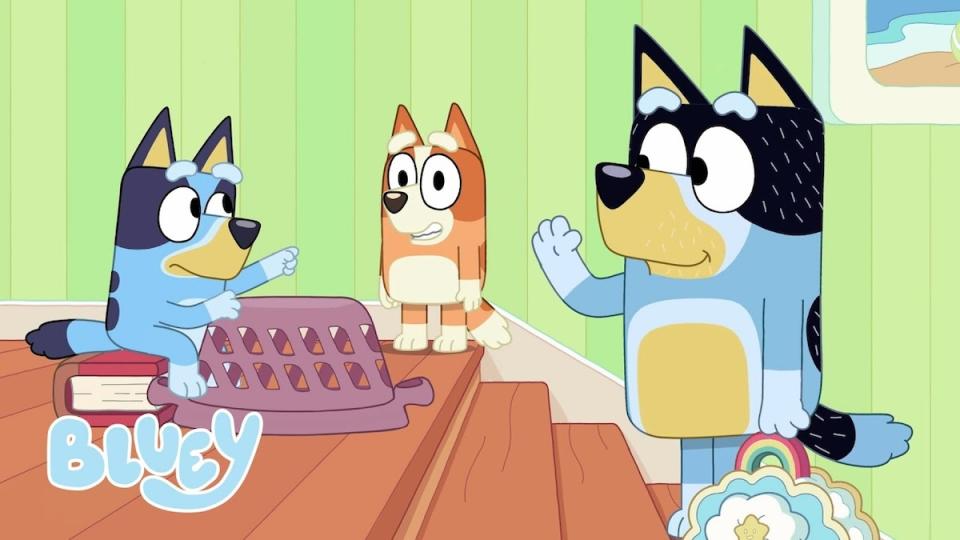
Bluey tries to run a hotel, and not for the first time and not for the last, she doesn’t listen to Bingo’s ideas. This early take on an enduring theme flies at the rate of a 30 Rock episode, powered by rapid-fire gags from Bandit’s check-in until the long-anticipated crazy pillow attack.
89. “Neighbours” (Season 1, Episode 47)
“Neighbours” could be “Suburbs” or “The Apartments” or any other community, where one person’s selfish but legal behavior can make life harder on others. Bandit and Bingo play bad neighbors to Chilli and Bluey, and by watching her mum, Bluey learns both the limits and power of asking nicely. Brumm clearly believes that if you are persistent and firm, it’s rarely necessary to be less than polite.
88. “Burger Shop” (Season 2, Episode 84)
This is how it always goes: You read the book, the kids somehow don’t respond like the book says they should, and everyone ends up wet and crying. The bath time rumble of “Burger Shop” doesn’t start out as a screwball comedy, but Brumm slowly twists the screws, skewering an advice industry that sometimes strays from reality.
87. “Keepy Uppy” (Season 1, Episode 3)
A simple premise, exciting for pups and nostalgic for us old dogs. Like a lot of Season 1 episodes, Brumm wrote “Keepy Uppy” as a self-contained game with a few stray jokes. It may not have all the depth that makes Bluey so beloved, but there’s something deeply satisfying about making sure no one drops the balloon.
86. “Trampoline” (Season 1, Episode 33)
Another perfectly simple setup: Bandit has to go to work (but not that urgently, never that urgently) and the pups would like him to linger and play. “Trampoline” has some fun with bouncing animations, and both parents and kids can relate to the scenes of bittersweet parting. Like a trampoline, it’s not going to change your life, but it’ll help pass a couple of minutes.
85. “Favourite Things” (Season 2, Episode 59)
Bluey episodes often feature either a central game or a series of short games linked by a theme, and “Favourite Things” is the latter. Here, the framing is around Bingo’s hurt feelings at dinner time, and Bluey’s increasingly elaborate attempts to make her feel better. It’s about the power — and limits — of being a good friend, with Bluey learning a lesson about emotional space, and Bandit embracing the word “Dude.” “Favourite Things” also saves its best gag until the very end.
84. “Featherwand” (Season 2, Episode 55)
Early in Season 2 Bingo takes center stage, first with “Dance Mode” and now “Featherwand,” which centers her anxiety on being left out. Bingo’s featherwand makes things heavy, stopping Bluey and Chilli from leaving the house. The game is a laugh, to the point where Bingo is happier staying home, and Lucky’s Dad belongs in the go-with guy hall of fame for his commitment to the heavy hat.
83. “Curry Quest” (Season 3, Episode 113)
A beat-by-beat exploration of Joseph Campbell’s hero’s journey, “Curry Quest” sends Bandit and Bingo off on an epic adventure to exchange homemade curries. The magpie might be one of the scariest villains in Bluey, which is to say, it’s not that scary, but it’s certainly satisfying to defeat with a bit of face paint trickery. (Speaking of the face paint, how nice is Mackenzie’s mom? She’s funny and doting, which is why “Space” makes no sense!)
82. “Horsey Ride” (Season 1, Episode 9)
Cousins Muffin and Socks return for a second visit to upend the Heeler house. This time, tiny Socks latches onto Bluey’s favorite stuffy, and the game (equestrian nuptials) is an attempt to distract the pup without resorting to force. The spat between the kids is familiar in an annoying way, and it’s the horses themselves that provide the most joy, with Bandit and his brother, Stripe, trying to follow a sports match without missing the wedding.
81. “Stories” (Season 3, Episode 132)
“Stories” is a twist on the themes of Season 3 opener “Perfect,” in which Chilli helped Bluey navigate artistic anxiety. This time, Brumm approaches those themes with a few favorite side-characters and a fresh storytelling frame. “What story would she tell herself this time?” our narrator, the pre-school teacher Calypso, asks. Indy is trying (and often failing) to make a clay horse that actually looks like a horse, supported by Winton (later muscular, often pretending to poop). In some ways “Stories” can feel almost random in the way it flits about introducing new elements, but it’s charming and certainly memorable. Also, this isn’t the first time you’ll hear about horses in Season 3.
80. “The Dump” (Season 1, Episode 34)
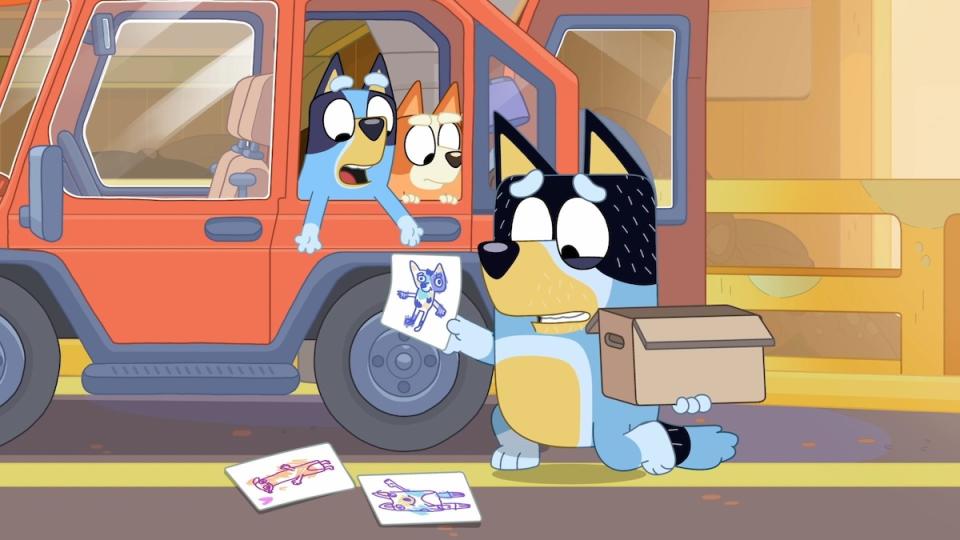
“The Dump” is a bit like Brumm’s version of a Coen brothers’ movie: Lovable characters hit the road, go through unconnected comic episodes, and experience a sudden devastation — in this case, Bluey discovering that her old pictures are headed for recycling. Her sense of betrayal feels sharp and fully earned, and her journey to understanding (about recycling, about life) is quietly beautiful. When the kids again cheer Bandit as the best dad in the world, we can share his relief when he shouts, “I’m back, baby!”
79. “Road Trip” (Season 2, Episode 98)
“Road Trip” kicks off a great run of transportation-themed episodes. This double-header features Bluey vs. Boredom and Bandit vs. The Gray Nomads. Without her tablet, Bluey’s tolerance for boredom is tested, and while the show takes a positive view of the games that help pass the time, the lesson is not that boredom can be done away with; it’s that sometimes, as Chilli puts it, “You’re just bored.”
Meanwhile, Bandit loses the race to stay in front of the retiree caravan, in the process embracing the journey instead of the destination. As a fellow neurotic dad driver, I would argue that Bandit got lucky, and if the pups had been as whiny as they were in “Mr. Monkeyjocks” the road trip would’ve descended into hell. But Chilli and probably Brumm would disagree; clearly, as Mum says, it’s better to have good times than make good time.
78. “Trains” (Season 2, Episode 67)
Bingo’s cyclical routine includes saying goodbye to her husband, dropping off her daughter Poppy at daycare, and working as an in-demand veterinarian. Bluey adds more than a dash of madness, and by carefully developing each of the train-stop storylines, Brumm manages to create surprisingly high stakes along the route.
77. “Helicopter” (Season 2, Episode 77)
Bluey often boasts lavish animation, but “Helicopter” shows Brumm doing more with less. The drama of the aviation is captured in different camera angles, suggesting everything from gentle tilts upwards to a thrilling crash. Bluey characters often use games to process their stress, but “Helicopter” has a twist — the game teaches Bluey to go with the flow, which helps her better handle disappointments.
76. “Bus” (Season 2, Episode 74)
Four words to elevate any episode: “Here come the grannies!” Chilli and Bandit’s in-game relationship is shallow but cute, and that’s ok. It mostly serves as a foil for Bluey and Bingo, the way a mountain might serve as a foil for dynamite. The episode’s slow build just further sells how quickly things get out of hand.
75. “Escape” (Season 2, Episode 73)
Ranging from the Heeler car to the mobile butler-powered palace and even outer space, “Escape” is a tour of transportation. The episode contains some of Bluey‘s most iconic art — shoutout to Jerry Lee! — and it’s no less charming for looking lo-fi. The flights of fancy, as parents and children try to one-up each other in the chase, unlock new levels of space-race slapstick. It’s not a key episode for relationships, and we may learn more about the state of their car’s backseat than their characters. But even so, it’s stunning to watch.
74. “Taxi” (Season 1, Episode 25)
Bluey plays a taxi driver, Bandit a passenger late for a flight, Chili voices sat-nav, and Bingo takes a series of wild cameos in this charming little farce. As the form was perfected on the British stage, farces are full of doors, and “Taxi” pays tribute to its door-slamming forebears by expanding the house so that Bandit has to run past dozens of closed-0ff rooms. It’s high-comedy fun.
73. “The Sign” (Season 3, Episode 153)
The 28-minute special tells three overlapping stories: A drama about selling the house and accepting the unknown, a family wedding sitcom, and what I’ll call Runaway Bride II: Getting Frisky, in which Chilli and the four children try to save the wedding.
Following the Heeler family as they plan the ceremony and celebrate at the reception is a smashing good time. This is Stripe’s funniest episode, culminating in an undignified crawl out of the hedge. We learn that Grandpa Bob spent time in India to “find himself,” and Nana is still giving him shit about it all these years later. The wedding DJ is the busker from “Dance Mode,” and he forces all the wedding guests to listen to a song he wrote. And it’s not all jokes, either — Muffin play-acts a couple’s fight while Trixie and Stripe argue in the background. This is the latest evidence in a trail of Season 3 clues that the couple Stripe and Trixie are not compatible. If Brumm does return to Bluey after a hiatus, it wouldn’t be a surprise to see him pick up the story after their divorce.
Frisky fleeing her wedding propels the action of “The Sign.” This story has moments of charm, especially around Bluey sitting in the front seat of the car and Chilli’s note that “Frisky and I used to come here as teenagers to, uh, think.” But the inciting incident feels unusually shallow by Bluey‘s standards.
Frisky is about the same age as Chilli, while Rad is older than Bandit. In every episode up until this point we’ve been led to believe they are rational, well-adjusted members of society who happen to have great hair. But hours before the wedding, it turns out they never even talked about where they were going to live. Then Frisky tries to call off the nuptials by telling a seven-year-old, and after speaking with said seven-year-old, her best friend Chilli decides to change Frisky’s mind, without wondering for even a moment if Bluey got the story right or Frisky might have a point. The three main adults in The Sign are all acting strangely based on how we’ve come to know the cast. It’s a rare Bluey example of the plot leading the characterizations, instead of the other way around.
Finally, we come to whether or not the Heelers will move. Bluey’s slow embrace of “We’ll see” as her mantra is sweet and well-earned. Calypso’s parable of the farmer and his horse continues Season 3’s theme of using horses as a symbol for challenges, and the lucky coin’s role in the resolution is surprising and clever.
Some people saw Bandit’s decision to stay as heroic, and some people thought it was anti-climactic after so much buildup. (Bluey‘s many fans in the military seem especially disappointed. After all, not every family gets so much choice in where they live.) I felt a bit of both ways, but my main gripe with the scene is its music.
As Bandit rips up the sign, we hear “Lazarus Drug” by Meg Washington, the voice of Calypso. It is an undeniably lovely song. It’s also the only time in Bluey we hear a tune with lyrics, and if that’s not distracting enough, I think it’s mixed wrong for the moment: loud enough and bright enough for Top 40 radio. Lead composer Joff Bush gave us the irresistible “Dance Mode” and the grand melodies of “Sleepytime,” and not trusting him for the most crucial moment in the special was a mistake.
“The Sign” was a cool experiment with some great laughs and genuinely moving moments. If Bluey comes back, it will be better for taking this risk. But at 28 long minutes, I bet some households skip this one in their rewatches.
72. “Octopus” (Season 2, Episode 93)
Chloe already proved a match for Bluey’s chaos in “The Adventure,” and with “Octopus” she takes the wheel of her own episode. Chloe’s dad, Frank, doesn’t play as energetically as Bandit (though his house is considerably nicer, so you can decide for yourself how sorry to feel for the family). Frank also takes a bit of a dry view towards learning about octopi. Chloe, meanwhile, keeps expressing frustration instead of what she wants. It takes a few missteps and more than a little communication, but the combined game, with Frank’s science-friendly additions, is even more fun than what they were playing at Bandit’s house.
71. “Bumpy and the Wise Old Wolfhound” (Season 1, Episode 32)
Bingo, in hospital for an unnamed issue, watches a movie from Bluey and family called “Bumpy and the Wise Old Wolfhound.” Brumm has a lot of fun crafting comedy out of the home video setup (“You can edit that out, right?”) but even better is the story, which covers huge themes of illness and luck with all the simplicity of a fable. Bingo’s whole family comes together to support her with “Bumpy,” and while she can’t leave the hospital, she’s already feeling better.
70. “Chest” (Season 3, Episode 115)
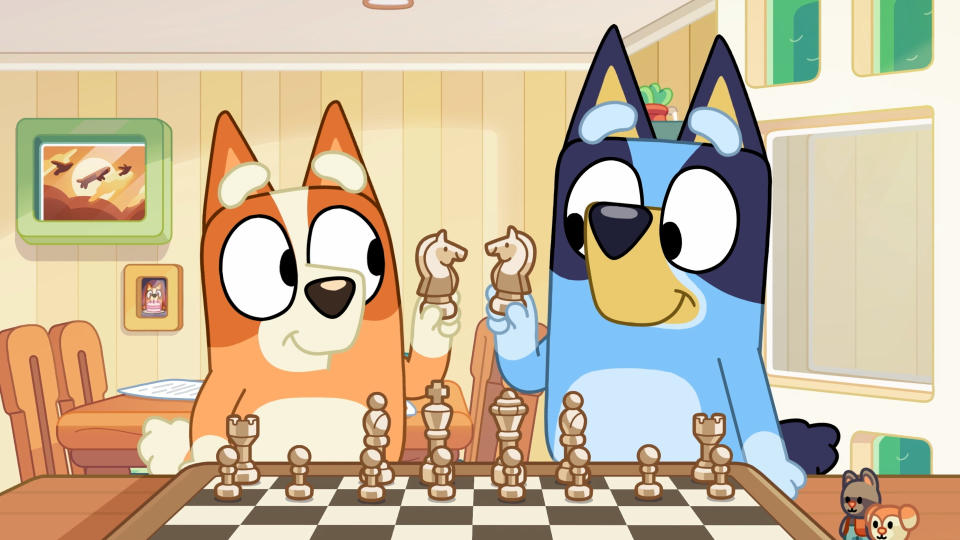
Bandit isn’t bad at many things, but teaching chess is one of them. Still, the joys of “chest,” as the pups call it, have little to do with ancient strategies. Bluey and Bingo obsess over the kings and queens while puzzling about why the horse is called the knight (justice for gallahop!) Chilli’s got the right idea, and as Bandit is trying to checkmate over the board, she wins the argument and changes his mind. The one way that chess is like raising children is that if your plan isn’t working, the only smart thing to do is try something new.
69. “Double Babysitter (Season 2, Episode 91)
Four years before “The Sign,” did anyone but Joe Brumm imagine that “Double Babysitter” would be such a key moment in the bigger Bluey storyline? Even without the plot weight, it’s fun. Visually, Rad and Frisky are a charming pair. Uncle Rad’s markings make no biological sense, but the unnatural colors have the impact of tattoos, especially when he’s holding his blue arms up by his red face. His hair coif is marvelous, but it pales in comparison to Frisky’s lush bangs and ponytail, which together might be the most finely-detailed hairstyle in the series.
They bond over a shared hair product and their love of kids, and when Frisky playfully pounces on Rad during a game, that is as overtly sexual as Bluey gets. The first-date energy is cute, and the rest is animation history.
68. “Fairytale” (Season 3, Episode 130)
Set in the magical world of the ’80s, “Fairytale” takes the kids game of saying “jinx” and frames it as a curse. The VHS animations are a nice touch, as is Bush’s synth-heavy score, but the real magic of this episode is seeing Bandit as a mean little boy. His lesson comes with pathos and wit, as he tells his children, “Nana was right, not about the perm, but about me.” “Fairytale” is playful and full of wonder.
67. “Fancy Restaurant” (Season 2, Episode 69)
Maybe you can relate, but it’s been a while since Bandit and Chilli experienced what Bluey inelegantly calls a “romance.” Through a surprisingly awkward play date, supervised by their children restaurateurs, the parents stumble towards a conversation about intimacy. Bluey and Bingo are hilarious, and as the parents learn, “romance” can look (and taste!) a little different as couples’ age.
66. “Typewriter” (Season 2, Episode 101)
Bluey is both a critic and author in “Typewriter,” a Wizard of Oz spoof that kicks off when she tries to improve on her preschool teacher’s story. Bluey decides she needs a “real typewriter” to write her version, so she starts off on a journey to see the great Calypso. Along the way, she’s joined by Winton the “space invader,” as well as Snickers, who is frustrated because his dachshund’s body is different than the other pups. Along the way, all three learn they had what they needed all along, whether that is imagination, or the ability to respect personal space, or the perfect body for you. “Typewriter” is a tiny epic.
65. “Markets” (Season 1, Episode 20)
A visit from the Tooth Fairy and a local weekend market teach Bluey and Indie about the value of a dollar — sorry, make that “five dollar bucks!” as Bandit fumes about fairy inflation. Your kids probably won’t follow the economics lesson about circulation in a closed economy, and anyway that’s less fun than the way “Markets” captures the wonder and anxiety of children exploring the adult world. Bluey and Indie travel from booth to booth, experience buyer’s remorse, and learn in the end it doesn’t matter. The lessons fade, but that communal feeling remains.
64. “Wagon Ride” (Season 1, Episode 24)
Every kid can be an annoying shit, the little dears. “Wagon Ride” is the heartwarming tale of a parent helping said little shit to deal with her boredom so that everyone can have a good time. With my oldest, I have tried to mimic Bandit’s calm explanation of his expectations, and my son has responded with more fortitude than I would have guessed. The show might show fairies and dragons, but teaching children patience isn’t just a fantasy. As Bandit says, it’s “Gotta be done!”
63. “The Quiet Game” (Season 2, Episode 89)
Bandit’s dad win — convincing the kids that being quiet is actually an exciting game — is short-lived when he has to buy their cousin a present. The two-way pranking is a lot of fun, and Alfie is endearing as a retail clerk on his first day. In the end, “The Quiet Game” feels longer than it is because there are so many memorable little scenes, as the children slowly chop dad down to size.
62. “Promises” (Season 2, Episode 108)
Similar to how “Teasing” straddled the line between playful and mean earlier in Season 2, “Promises” shows how a simple promise can offer surprising complications. The way Bandit and Bluey trick each other brings plenty of smiles, and Bluey’s growth by the end is satisfying. “Promises” is another look at one of Bluey‘s most enduring themes: the importance of trust.
61 and 60. “Unicourse” (Season 3, Episode 112) and “Puppets” (Season 3, Episode 133)
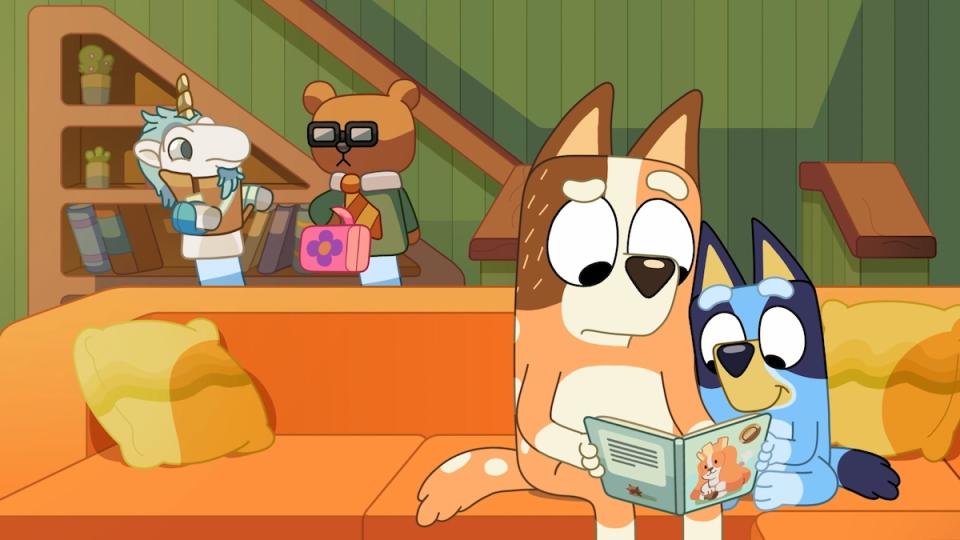
We all had the same experience with the character Unicourse, right? The first time we watched “Unicourse” we wanted to shove his horn in the garbage disposal — or maybe your fantasies involved some kind of knife or axe, I’m not sure. But the second time through we got over the annoying voice and chuckled at the jokes (“What do unicorns eat?” “Children,”). Now, he’s a top 20 character on a show with a rich roster of personalities.
In his introductory episode, Unicourse brings out a feistier side in Chilli, one that’s always enjoyable to watch. She never stays mad at Bandit for long, because that would be a very different kind of show, but in “Unicourse” she is throwing heat for six-minutes straight.
“Unicourse” broke some conventions, but the follow-up, “Puppets,” shattered the fourth wall. Unicourse’s slow realization that he is in fact, a puppet, is surprisingly heartfelt, and Bandit’s sigh of, “The thing is, I do it to myself,” is as relatable as the show gets. The meta ending — or as Bluey puts it, “That was a weird dream,” — is divisive. I understand that some people hate his episode, which brings me to just one question: Annnnnnnnnnnd why should I care?
59. “Sticky Gecko” (Season 2, Episode 64)
“The door! It’s right here! All we need to do is walk out of it!” Mum’s turn to endure a “Takeaway” meltdown isn’t quite as hilarious as the Season 1 original, if only because the cadence is familiar. But man that cadence is fun, as Chilli tries to respect her children’s priorities while also getting them out the door. Chattermax getting used as a battering ram against sticky gecko might be the comic peak, and the moment Chilli snaps is endearingly relatable. “Sticky Gecko” sticks with you.
58. “Dragon” (Season 3, Episode 147)
“Dragon” rolls initiative for a Dungeons & Dragons style quest, with each fantasy character animated to match the skill of the artist. Bandit’s muscly barbarian isn’t any more developed than Bluey’s winged wizard, while Chilli’s technique shows in a horse with a much higher frame rate than the other Heelers. The magic of the world is used to great effect, especially within Bandit and Chilli’s memories, where how to draw a horse again becomes a metaphor for obstacles. “Dagon” also offers one, heartbreaking look at Chilli’s mom. “Dragon” is another Season 3 lesson on accepting that your art is good enough for now, told with even more wild creativity than before.
57. “Chickenrat” (Season 1, Episode 46)
Like Christopher Nolan’s Memento, the mysteries of “Chickenrat” are revealed as the plot is told in reverse chronological order. Here, the two mysteries are, “Where is Bingo’s stuffed rabbit, Floppy?” and “Why is Bandit acting like a… a… hang on, sorry, what’s a chickenrat?” This episode is a tidy spoof.
56. “Charades” (Season 2, Episode 63)
There’s no such thing as a bad time with Muffin and Socks. Here, the younger cousins don’t quite grasp the point of charades, and Bluey and Bingo aren’t sure how to continue the game. While learning that they “need to take care of the littlies,” Bluey and Bingo hear about their Nana’s nana’s music box. This family heirloom represents the unbroken chain connecting generations, and when Bluey and Bingo bend the rules so that Muffin has fun, they link themselves with all the loving women that came before. For an episode about a toddler meltdown, “Charades” is surprisingly delightful.
55. “The Weekend” (Season 1, Episode 6)
This compact tone poem of an episode was adapted and re-written from a 2017 pilot, and it packs a surprising amount of plot into a few short minutes. There’s a farcical game of musical statues, breaks for Bandit to poop while the kids plug their noses, and the show’s first Bingo storyline, in which the little pup’s feelings are hurt. It’s fun, surprisingly emotional, and like the real weekend, it’ll be over before you know it.
54. “Dirt” (Season 3, Episode 140)
Chow Chows “have such long hair,” Wendy absently reminds Judo, but what Wendy sees as advice stifles Judo’s ability to play. Trying to avoid dirt almost stops the pup from acting like a pup, leading to Wendy’s radical decision to cut her own hair. In that moment, we finally understand Chilli’s loyalty to Wendy in “Sticky Gecko,” and both Chow Chows redeem their earlier, somewhat judgmental behavior.
53. “BBQ” (Season 1, Episode 7)
Meet Muffin and Socks, perhaps the most hilarious characters on a very funny show. These Heeler cousins don’t do much in their first televised visit, though Muffin’s demands for an increasingly-complex salad do hint at future hijinks. Instead we follow Bingo as she unknowingly shadows her mom: exhausted, unable to relax, and with a to-do list that never gets shorter. Bingo’s mishap with the hose is a slapstick masterpiece, and her outburst of, “Isn’t anyone going to mention the salad?” lands as a ringing call to acknowledge invisible labor everywhere.
52. “Calypso” (Season 1, Episode 17)
By this point in Season 1 the side characters are coming into focus, and “Calypso” introduces us to the wonderful world of Bluey’s school. As a parent, watching Calypso’s careful playtime management is deeply gratifying, but the real fun here are the classmates. The battle-ready terriers enliven any scene they invade, and Rusty will go on to become a fan favorite. “Calypso” doesn’t have a ton of jokes or deep emotional undertones, but the rhythm of walking around encouraging kids to interact is irresistible.
51. “Omelette” (Season 3, Episode 109)
Following the tone set by “Perfect” in the Season 3 opener, the characters of “Omelette” celebrate Dad even as the story relegates him to comic relief. Bandit’s birthday breakfast is beside the point — well, to everyone but him — and as a mum-daughter cooking comedy, “Omelette” is a side-splitting good time.
50. “Daddy Dropoff” (Season 2, Episode 60)
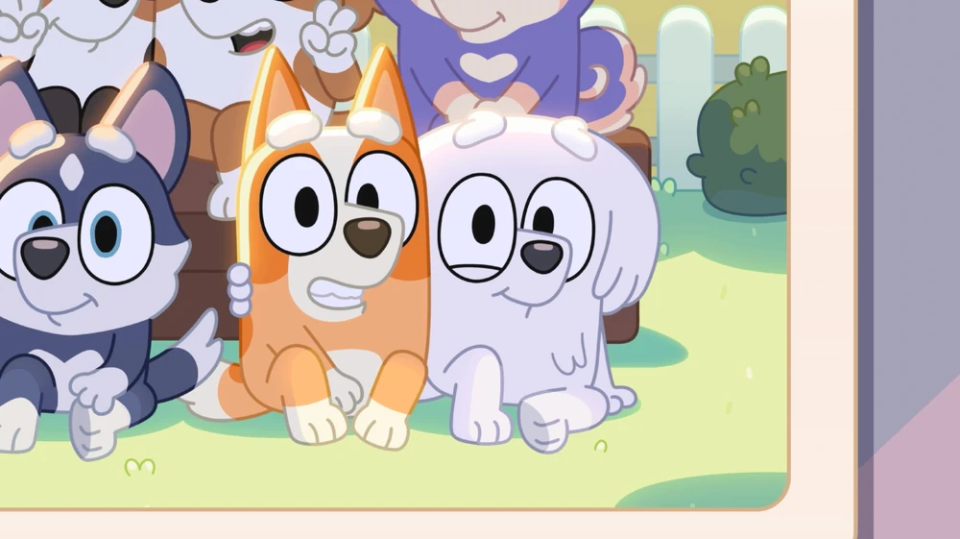
The hectic stress of weekday mornings is here taken to hilarious extremes. Repeatedly, Bandit indulges in games that make the kids later, even as it increases his own anxiety. One of the series’ funniest extended bits happens in the car, when Bandit needs to ask Bingo if she remembered her jumper, but Bingo insists she’s only reachable by phone, and Bandit keeps accidentally dialing someone called Marjorie.
Despite the jokes, “Daddy Dropoff” would be lower on the list if not for the emotional wallop named Lila, who grows up to be Bingo’s best friend. Within the script, their friendship is a bit of good luck — if Bandit hadn’t indulged all the games, Bingo wouldn’t have arrived at kindergarten right when Lila hid in the corner. But in the meta-world of the show, Brumm’s message seems clear: We might not be able to raise billionaires or geniuses, but if we’re patient and present, we can raise good friends.
49 and 48. “Relax” (Season 3, Episode 144) and “Stickbird” (Season 3, Episode 145)
Season 3’s Heeler family vacation unfolds over two linked episodes, as Chilli and Bandit wrestle separate anxieties. Chilli is up first in “Relax,” where she’s so wired for resting on the beach that she’s unable to enjoy it when she gets there. Bluey and Bingo’s hotel shenanigans are as rooted in real hotels as they are funny, a great combination. After Chilli finally decides to stay in the hotel room, “Relax” ends with the pups demanding to go to the beach, leading straight into “Stickbird.”
We never learn what’s bothering bandit in “Stickbird,” though Chilli’s urge to “Let it go, babe,” suggests it’s more of an acute worry than a general depression — perhaps he already anticipates the big conflict of “The Sign?” Regardless, it’s in watching Bingo struggle with her disappointment that he realizes how important it is to fix his own mood. His decision to throw what’s bothering him into the sea caps off an episode’s worth of gorgeous animation, as the serene beach gives way to bubbling depths.
47. “Bin Night” (Season 2, Episode 94)
Joff Bush wrote more emotional scores for Bluey, but no other music matches “Bin Night” for sheer cleverness. The melody at the end is teased throughout, in different pieces tied to the different phases of the moon. The rhythm of Brumm’s script is just as musical, following the cycles of days and nights alongside half, full, and quarter moons. These repetitions unfold in counter-rhythm to the forward motion of the pups’ growing up, as Bluey ponders her future job and Bingo turns enemies to friends. “Bin Night” asks us to measure our lives against a grander cycle.
46. “Teasing” (Season 1, Episode 48)
What’s the difference between playing and teasing? For Dadly trolls like Bandit, it can be hard to tell. “Teasing” sets up a series of playful bits with Bandit as antagonist, while Bluey and Bingo start off, first as the antagonized, and then as the heroic victors. The volume knob bit pays off at the end as Bandit tries to give the moral lesson, but Brumm still tips his hand with one-last follow-up: Bandit apologizing when he went too far. The early moralizing is almost entirely gone from Bluey by this point in Season 1, as Brumm masters the art of show, don’t tell.
45 and 44. “Early Baby” (Season 1, Episode 40) and “Mums and Dads” (Season 1, Episode 41)
Towards the end of Season 1 Brumm experimented with the first pair of linked episodes that can almost be thought of as two-parters. “Early Baby” and “Mums and Dads” make up a single romantic comedy — one that’s no less complex despite being innocent.
Like Darcy and Elizabeth, Rusty and Indy start out hating each other, believing the other ruined their game. Indy was playing early baby, apparently processing some stress involving a recently born sister. Meanwhile, Rusty was busy rescuing a baby princess from an evil sausage-shaped dragon. As their teacher Calypso helps them understand, these seemingly different dogs — the gluten-free, hippie-dippy Indy, and Rusty, a sports-obsessed military brat — share similar values, especially a curiosity about babies.
The first episode ends with the other pre-schoolers scattering to fight the dragon, while Rusty and Indy come together to play “Mums and Dads.” But it’s not all happily ever after; Indy expects Rusty to be a stay-at-home dad, while Rusty thought Indy would become a stay-at-home mom. Both are modeling what they see at home, once again unable to understand the other’s perspective.
Here they separate, stubbornly insisting on playing the game their way. But none of the other pups want what they want. Indy tries to make it work with both Mackenzie and one of the terriers, who won’t prioritize the baby. Meanwhile, Rusty gets drawn into an absolutely toxic play-relationship with Bluey, who steals every scene as a lunatic mother. Finally willing to compromise, Indy and Rusty reunite and problem solve (“Let’s play weekend!”).
Together, “Early Baby” and “Mums and Dads” presents a surprisingly nuanced depiction of a play marriage. The lesson the pups will have to learn, not once but over and over, is that if you want to keep the game going, you have to see the world through your partner’s eyes.
43. “Hammerbarn” (Season 2, Episode 54)
They say that comparison is the thief of joy, but did they ever consider that maybe the real joy burglar is not having a pizza oven? Bandit is jealous of Lucky’s Dad’s new outdoor pie cooker, Chilli can’t stop stressing about things in the house breaking, and Bluey and Bingo are obsessed with making sure the other one never gets extra anything. Mum and Dad’s issues can be solved at Hammerbarn — though it is not lost on Chilli, the star of the episode, that her problem is literally the whole house while everyone else is worried about bullshit.
The sibling squabble is harder to get through — as Chilli says with acid over a broken garden gnome, “Someone’s husband eventually gets it.” But Bluey and Bingo do learn to focus on themselves, and after Chilli makes sure the house is working, she is rewarded with perhaps the best damn pizza of her life. In that moment, Brumm captures a special kind of satisfaction, when a stressful day was worth it.
42. “Bedroom” (Season 3, Episode 106)
Bluey and Bingo share a deep affection for each other, but nowhere is their sisterly bond stronger than in “Bedroom.” The ritual of moving out of a shared room is interrupted by how much they miss each other — the episode is as sweet and simple as that.
41. “Tradies” (Season 3, Episode 136)
Back in Season 2’s “Stumpfest” Chilli talked about putting in a pond, and “Tradies” sees that plan followed through. Bluey and Bingo spy on the installation, and as the “enemies” Chocolate Milk and Big Belt turn into Chippy and Sparky, they don’t seem so much like enemies after all. “Tradies” stands out for the likable Sparky and hapless Chippy, and how deep the pups see into their world.
40. “Obstacle Course” (Season 3, Episode 107)
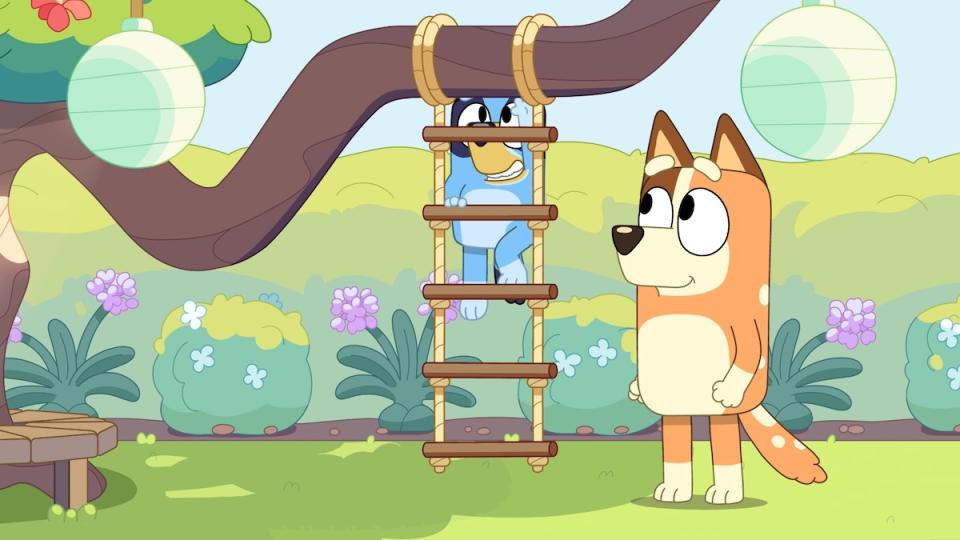
Cue “Eye of the Tiger” (“Eye of the Greyhound?”), an underdog is ready to train: “Obstacle Course” sets Bluey against Bandit in a classic sports tale with some slightly weird hurdles. There are lessons learned, though Bingo never does figure out the stopwatch, and for a deeply moral show “Obstacle Course” boasts a surprising amount of cheating. But in the end, the underdog triumphs, and that never gets old.
39. “Fruitbat” (Season 1, Episode 8)
I feel exhausted just watching Bandit put those kids in bed, especially Bluey, who is tireless in fighting sleep. Her sudden interest with fruitbats is metamorphisized into perhaps the second-loveliest dream sequences in kids’ TV. Even without comparisons to “Sleepytime,” “Fruitbat” is mysterious and beautiful..
38. “Copycat” (Season 1, Episode 38)
“Copycat” has a rollercoaster tone switch. The copycat game Bluey plays with her dad features some good gags, especially when he embarrasses himself in front of neighbor Wendy. But after the Heelers find the injured bird, “Copycat” becomes about life, death, and how we model grief for our children. Bluey’s fascination with death may be morbid, but it also rings true. All we can do is prepare our kids; as Bingo the copycat budgie unwittingly proves, every change has its own surprises.
37. “Family Meeting” (Season 3, Episode 127)
A surprisingly sophisticated episode about farts, “Family Meeting” is structured like a trial with all the twists and turns of a legal thriller. But that’s just a framework for fluffies, baking brownies, and all sorts of playful euphemisms. The jokes land even harder than the message about telling the truth, and like a Law and Order rewatch, knowing the twists doesn’t take away the fun.
36. “Asparagus” (Season 1, Episode 49)
The Bluey version of The Magician’s Apprentice has a lot more clucking than Walt Disney’s tale, but the basics are the same: A young person uses magic to avoid something they’d rather not do, only to learn the hard way why it was important. Here, it’s manners, and more generally the desire to do the right thing, including eating your vegetables. But this is only interesting to the adults — the kids will be too busy giggling at the show-off peacock getting chased by hungry lions, as well as one of Lucky’s Dad most iconic appearances (“I shouldn’t have let my guard down!”).
35 and 34. “Duck Cake” (Season 2, Episode 96) and “Handstand” (Season 2, Episode 97)
Bingo’s birthday party is an occasion for two linked episodes, though the tones and themes are different. In “Duck Cake,” Bandit struggles to make a difficult dessert centerpiece, while also managing Bluey, who is procrastinating on picking up her mess. Few moments in any family show are as relatable as when Bandit drops the duck’s head on the ground and sinks to the kitchen floor, trying to hide his despair from his daughter. The happy ending is just the icing on the — well, you know.
After Bluey’s empathetic response in “Duck Cake,” “Handstand” picks up amid the all-out madness of a children’s birthday party. This episode has a fun animation conceit, as different pups play in loops around the house.
The plot is about how easy it is to ignore our loved ones. First, Bingo is determined to master a handstand, but as her parents are pulled in every direction, they keep missing the feat. This arc is paused at the arrival of Nana, Bingo’s grandmother. She repeatedly offers to help the adults, and is each time politely rebuffed and told to “relax.” There’s a lonely sorrow to Nana, as person after person ignores her while telling themselves they’re being helpful. Whether or not you manage to keep a dry eye, you’ll be rewarded with the pure joy of Nana and Bingo finding each other.
33. “Pass the Parcel” (Season 3, Episode 118)
Lucky’s Dad, Pat, worries about the popular version of a party gift game. Everyone gets a crappy prize and no one’s feelings are hurt, which he thinks means “we’re raising a nation of squibs!”
Pat pushes for a change in the version of pass the parcel played at Lucky’s party, and then he royally screws it up. He doesn’t fully explain the rules to the kids, he can’t work the music properly, and soon almost all of the young pups are crying. “I’m not cut out for this,” he says, and later we see him back off. This episode changes Pat’s parenting style.
To his credit, he acknowledges his mistake, and then something else happens: Some of the kids come to love “Lucky’s Dad’s rules.” Not everyone gets a prize, sure, but the winner takes home something really nifty, and their excitement is infectious. It’s harder on Bingo than most kids, but soon enough she learns to handle disappointment.
Typical of the complexity of Season 3, the different characters learn their own separate lessons. Pat realizes why his version of pass the parcel changed, understanding in the process more about what kind of parent he wants to be, and Bingo hardens her resolve. “Pass the Parcel” does not suggest that one worldview is best, but instead celebrates all of our capacities to learn and grow.
32. “Sheepdog” (Season 1, Episode 116)
It’s hard to be the default parent, the one that the kids keep asking for. It is also hard to stand between the children and their preferred parent, as Bandit learns when Chilli asks for “20 minutes when no one talks to me.” He offers to play the most humiliating game the kids can think of, and as if to emphasize how little Dad’s dignity matters, Brumm gives him a mullet. “Sheepdog” is also a major turning point in Bandit’s relationship with Wendy, who shear said mullet off. After two seasons of Bandit scandalizing his neighbor, “Sheepdog” marks the beginning of a strained yet lovely friendship.
31. “The Claw” (Season 1, Episode 19)
By this point in Season 1 Brumm had come into his voice, and the moral lessons of Bluey were far more likely to be delivered on a banana peel than in a sermon. “This is great!” Bandit tells Chilli as the kids run like mad to do chores in exchange for more shots at the magic claw. “They’re learning a lesson and we’re getting the house cleaned.”
“Neither of those things are happening,” she replies, and it’s true. By the end of the episode, the only dog to learn anything is Dad. Few episodes are as funny, and few ground their humor so firmly in the characters and relationships. Unlike a real claw machine, “The Claw” doesn’t miss.
30. “Onesies” (Season 3, Episode 135)
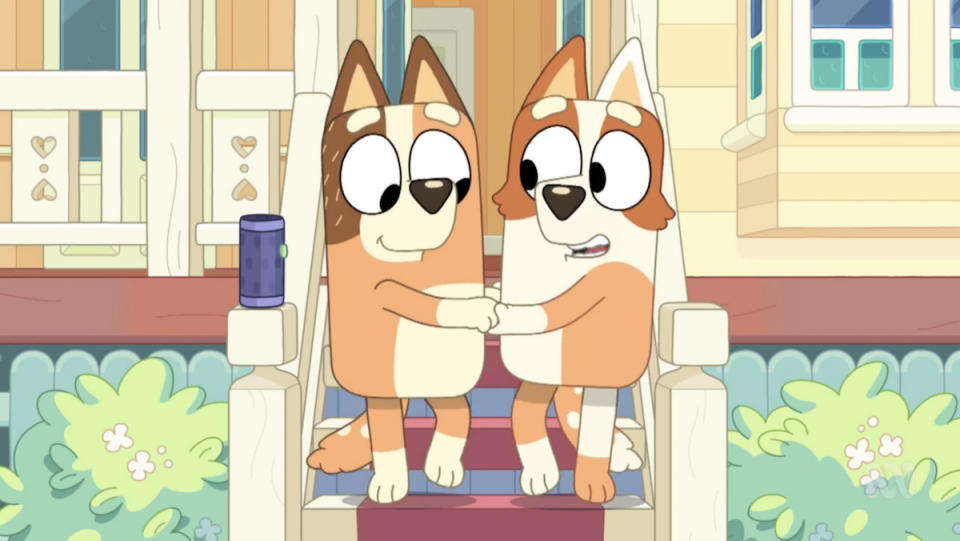
Chilli’s sister, named Brandy and voiced by Rose Byrne, visits for the first time. While Bingo merges with her cheetah onesie and goes on the hunt, the elder sisters’ tension is revealed in broad allusions to things Brandy can’t have and her complicated feelings about kids. It’s a novel’s worth of backstory in a few awkward scenes, made sadder because Bingo looks exactly like a woman she barely knows. And later, all that emotion comes pouring out in a few brief moments of The Sign.
29. “Perfect” (Season 3, Episode 105)
Brumm kicked off Season 3 with an exercise in anxiety, as Bluey frets that her next drawing won’t be good enough to go on the fridge. This isn’t a suddenly-famous writer gazing at his navel, though; “Perfect” is much more concerned with Bluey’s neuroticism about her Father’s Day card and what it reveals about recent family dynamics. The cutaways to Bandit are hilarious (“Don’t tell your Mum!”), but even though it’s a Father’s Day episode, Chilli takes center stage. She guides Bluey towards understanding that perfection can be chased but never caught, while also realizing how she herself fueled her daughter’s worries. The tone is much closer to comedy than tear-jerker, but in Season 3 even the funniest episodes are built on strong emotional foundations.
28. “Café” (Season 2, Episode 87)
Bandit making a platonic dad friend is more heartwarming than any of Bluey‘s romantic storylines: The awkward courtship, the high-stakes small talk, and the warmth of connection are all charmingly pure. The animators deserve a Grammy just for the bit where the dads have to stand up from those tiny tables, as well as the longing they put into Bandit’s eyes when he’s stuck across the park from his friend. “Café” is funny and touching, and parents of older children assure me that the episode’s central relationship isn’t just a fantasy.
27. “Grandad” (Season 2, Episode 79)
Chilli’s dad isn’t doing what the doctors tell him to do, which is dramatized with an allegorical chase: Grandad and the pups run away from Chilli, specifically, and responsibilities, generally. The Lord of the Rings hunt parody is fun, and Grandad’s friend Maynard is a hoot and a half. But beneath all the hilarity is the love and helplessness adult children feel when trying to help their aging parents.
26. “Mini Bluey” (Season 3, Episode 111)
In “Kids,” Bluey touched on why we love our children equally. “Mini Bluey” takes this a step further and dares to ask — is it ok to find one of your kids more annoying? Two Blueys soon wear on Bandit’s nerves, but when he enjoys double Bingos a bit too audibly, Bluey’s feelings are hurt. Even as he knows he messed up, Bandit whispers to Chilli, “But seriously, how good is double Bingo?” Luckily there’s a happy ending, and it involves the realization that Bingo is actually super annoying, too. In “Mini Bluey,” parents, pups, and Joe Brumm are all having a cheeky good time.
25. “Grannies” (Season 1, Episode 28)
This is the first time we meet Nana, but with apologies to the matriarch of the Heeler clan, she’s not the star of the show. There’s a reason that Bluey and Bingo’s elderly alter egos, Janet and Rita, became go-tos creator Brumm: They’re hilarious. The pups’ impressions of their grandma are softened by their adoration for the real thing, as shown by the easy relationship they have over Facetime Faceytalk. Now in the second half of Season 1, Brumm was still finding totally fresh elements that would influence the next hundred-plus episodes.
24. “Dance Mode” (Season 2, Episode 53)
Composer Joff Bush is Bluey‘s not-so-secret weapon, and “Dance Mode” is his brightest, most irresistible creation. Meanwhile, Bingo keeps saying yes when she means no, a problem expressed in the form of mandatory groove sessions. Mum and Dad’s big dance sequence at the end is also a perfect distillation of Brumm’s philosophy: Parental dignity is worth nothing, while kids feeling a sense of control is everything. This is a fun one for children to play “for real life,” and that killer song takes the story from good to great.
23. “Faceytalk” (Season 3, Episode 128)
Like so many of Bluey‘s funniest episodes, “Faceytalk” stars Bluey and Bingo’s excitable younger cousins, Muffin and Socks. Over video chat, Muffin struggles with sharing, ending with her grabbing the phone and dashing around the house while being chased by her dad, Uncle Stripe. The kids learn about fairness, while Uncle Stripe and Aunt Trixie have to wrestle with their different ideas about the best way to discipline children.
The conversation that runs, “We don’t do time-out anymore,” into “We don’t?” and “I read a book!” is a hoot, especially when the new tactic fails and both parents can only scream, “Time out!”
Among Stripe and Trixie’s fights in Season 3, this is the only time it looks like they have the tools to make it work. Both kids and parents are learning lessons, and their split conundrums are matched to a daring split-screen video chat animation. Best of all, Muffins’ mad dash for Faceytalk control is slapstick perfection.
22. “Surprise” (Season 3, Episode 154)
Whether Brumm’s good-bye turns out to be merely for now or actually forever, “Surprise” is as cleverly packaged as a jack-in-the-box. The first section is largely a setup for Chilli’s punchline, “That’s what having kids is like!” Beforehand, Brumm lays out a play version of a stressed-but-happy parental life.
All Bandit wants to do is watch the race. But in Bingo’s game he’s obligated to get babies to sleep, drop them off at daycare, and manage health crises. Meanwhile, Bluey’s game (Brumm emphasizes that she borrowed the foam blaster from Mackenzie) is full of uncomfortable stressors, leaving Bandit exhausted and in physical pain. However, the chaos is kind of fun, and as Bandit explains in a pep-talk to one of Bingo’s many children, life’s obstacles are easier with your family behind you.
Throughout, Bluey wonders if she’d like to be a mom, and an audacious flash-forward answers that question. Chilli and Bandit easily transition into old sitcom grandparents, and you can imagine how Bluey might return with three different generations of Heelers. That’s also because Brumm leaves us with a surprising look at Bluey’s child, who themselves look an awful lot like Mackenzie. (Brumm has been not-so-subtly telling us that Bluey and Mackenzie end up together since “Barky Boats” in Season 2, disappointing everyone who dreamed of what followed Jean-Luc’s “‘Ello, Bluey.”)
In many ways, Brumm has been coy about his plans. But as “Surprise” proves once again, he has always had ideas about what happens next.
21. “TV Shop” (Season 3, Episode 149)
The question of whether Coco is OK motivates Bluey, but that’s besides the point for us: The CCTV cameras capture the excitement of the kids, as well as how big and enchanting the store is to them, even as the adults find it mundane. Bluey and Bingo get lost in a labyrinth that Bandit can see right over, which is why they have an adventure (and maybe bum worms?) after he only gets some vitamins.
20. “Shadowlands” (Season 1, Episode 5)
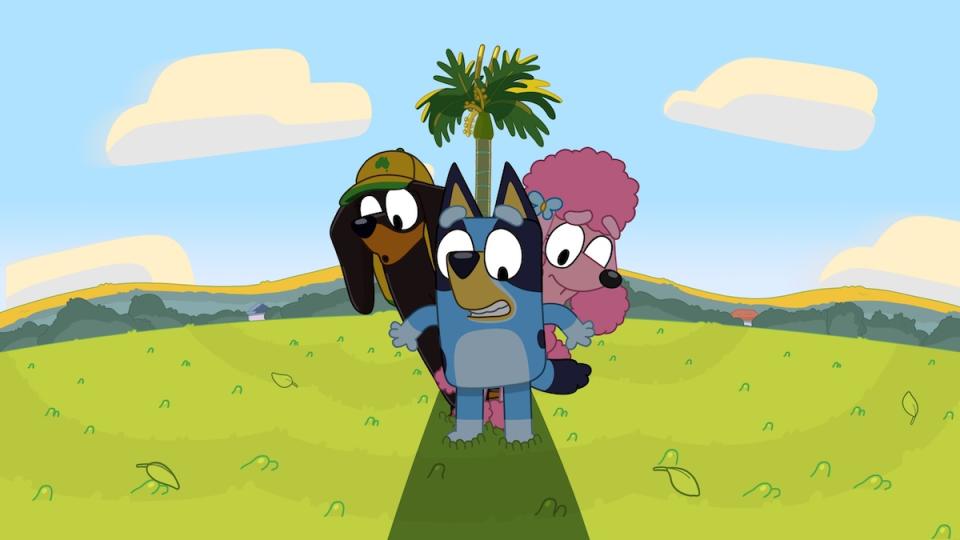
At a time when so many kids’ shows are going cheap with their computer graphics and YouTube redefined trash, Bluey set a new standard for animation as far back as episode five. “Shadowlands” introduced Bluey’s friends Mackenzie and Coco for the first time, expanding the world even as quick clouds and moving shadows brought the visual artistry to another level. The game itself feels high stakes and fun, sweeping the viewers back into the endless afternoons of childhood. “Shadowlands” was Bluey‘s first great episode.
19. “Easter” (Season 2, Episode 104)
The Easter Bunny “forgot” Bluey and Bingo last year, which helps parents in the audience feel better about the absolutely insane Easter egg hunt planned for them this time around. The high-energy pace, kept lively with an adventure movie score, puts us right there in the hunt. Perhaps like the source material, “Easter” is more magical than literal, capturing the pure wonder of those Sunday morning egg scrambles.
18. “The Sleepover” (Season 1, Episode 39)
Muffin is already too much toddler, and when she becomes overtired, she rips through the Heeler household like a drunken frat boy fleeing campus security. With Bingo fully developed and Muffin in the fold, Bluey hit its stride as a sitcom, turning the quirks of its characters into pure hilarity.
17.”Born Yesterday” (Season 3, Episode 110)
Bandit begins this game asking, “Is it too late to bend over?” but by the end of “Born Yesterday,” he’s not ready for it to end. What starts out as a vehicle for comedy (“I have nothing to say about the Sun!”) soon turns profound for Dad, and the zoom-in on the leaf is perspective-shattering. “Born Yesterday” invites us to see the world through fresh eyes.
16. “Flat Pack” (Season 2, Episode 76)
“Flatpack” is Joe Brumm at his most cerebral. While the girls play at fish, dinosaurs, small mammals, monkeys, and cave-dogs, their bumbling parents assemble a flatpack. It’s no accident that as the pups speed through evolution, the adult plot finds upright dogs using tools. But Brumm has one more trick up his sleeve, and while Bluey and Bingo evolve, they also grow together as a mum and her daughter. In the end all the ideas come crashing together, as Bingo leaves Bluey to explore the universe.
15. “Whale Watching” (Season 3, Episode 126)
It’s New Year’s Day, and Bandit and Chilli are so hungover it hurts. But the kids want to play, casting Dad as a boat and Chilli as a whale basking on the couch. Some of the best jokes come in Mum and Dad’s efforts to make the other play more energetically. But hangover or no hangover, when your pup need you, you’ve got to rise to the occasion — in Chilli’s case, literally.
14. “Granny Mobile” (Season 3, Episode 137)
Separately, Muffin and the Grannies are two of the funniest recurring bits in Bluey, and their union is as great as we could have dreamed. The world’s grouchiest granny faces off against Muffin, fully committed to the bit, and their showdown feels as big and bruising as Godzilla vs. Kong. “Granny Mobile” is Muffin’s crowning performance, a masterpiece of chaos.
13. “Stumpfest” (Season 2, Episode 58)
The key moment in “Stumpfest” finds Chilli explaining to Bluey that while she and the girls are playing a fun game, the men are also playing. What Chilli doesn’t mention is that she’s getting a pond out of all of this, but Mum enjoying herself while men and girls squabble is half the fun. In the end, the dads all enjoy manis, the stump gets removed, and the girls start slinging lemonade — though how they acquired it, nobody knows, since neither life nor anyone else gave them lemons.
12. “Ghostbasket” (Season 3, Episode 152)
“Ghostbasket” ends with a jump scare, when a long pan out reveals a For Sale sign in the Heeler yard. Unless viewers had details about “The Sign” spoiled for them, they didn’t fully understand the stakes of the episode until that moment, as Bluey and Bingo’s Grannies tried to thwart Bandit’s real estate salesman. On second viewing, Bluey’s words ring loud and clear: “We don’t want you to sell this place.” “You’re not selling our house.” And all of the shenani-Grans are revealed as a very serious attempt by two confused pups to understand the loss of their home.
“Ghostbasket” is another fine example of the great Bluey meta-theme, the importance of playing out our overwhelming feelings. Compared to the others — “Early Baby,” “Copycat,” “Daddy Putdown,” “Fancy Restaurant” for the adults — “Ghostbasket” is the most laugh-out-loud funny. From the winking exchange of “Seems small,” and, “It’s bigger inside,” through the Grannies tackling Chilli, and the Benny Hill homage in the hallway to Chilli’s Waiting for Guffman acting performance when she pretends to be scared,”Ghostbasket” never stops being funny.
11. “Army” (Season 2, Episode 68)
No one ever says that Jack is neurodivergent, but in a tense car ride we see how it adds stress for his loving parents and creates distance between Jack and his sister. “There’s something going on with me,” he confesses later. Luckily, towards the beginning of “Army,” he meets Rusty.
Rusty loves playing army because it helps him feel closer to his father, an active duty serviceman. And while Jack struggles remembering instructions and following directions, he thrives in the high-energy structure of Rusty’s military. When Rusty puts his trust in Jack during a wartime skirmish, it’s implied that most people don’t trust Jack the way that Rusty is trusting Jack. And when Jack rises to the challenge, he becomes a hero in-game and to himself.
And look, I know Bluey is “just monkeys singing songs, mate,” but in “Movies” when Bandit says those words, he’s also reminded of how art can help us, heal us, and maybe change us forever. I can’t talk about “Army” without acknowledging how much the character of Jack has come to mean for families around the world.
I’m in a couple of parenting groups and the largest one is Bluey themed. Comments that start, “My child is a Jack and they’re having trouble at school,” have led to the most beautiful outpourings of support I’ve ever seen on social media. Perhaps those conversations are so productive because the parents start from the same viewpoint as the show: The Jacks of the world thrive when we put our faith in them, the same as everyone else. In Bluey and in real life, Jack is a hero.
10. “Baby Race” (Season 2, Episode 102)
Baby Bluey is super cute, parental pressure is not. Within flashbacks, a younger Chilli tracks the developmental accomplishments of other babies against Bluey’s lagging efforts to walk. She reads books, gets down on all fours, and even solicits some questionable advice from Nana that might not be “legal anymore.” After turning herself into a nervous wreck, Chilli accepts the wisdom of running her own race, and finally shows herself some grace.
09. “Movies” (Seas0n 2, Episode 81)
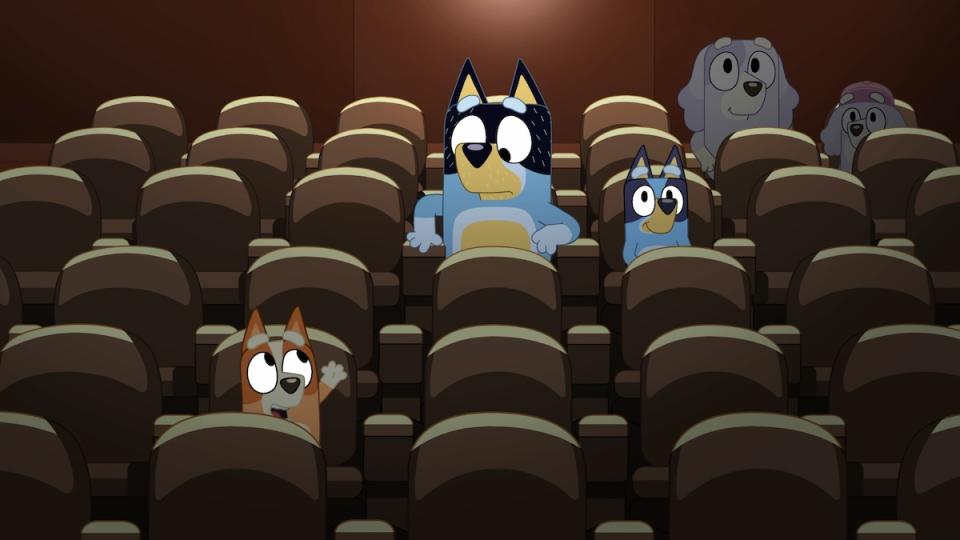
Bandit takes the pups to see a Chunky Chimp movie (not to be confused with the Chutney Chimp series mentioned in “Takeaway,’) while Brumm guides viewers through a great meta commentaries on children’s entertainment. First, the basic joke here is that the dogs watch cartoons about anthropomorphic monkeys, which is, uh, vaguely relatable. Bandit’s commentary — “Look mate, I’m pretty sure the monkey is going to find out that being different is a good thing,” and, “It’s just monkeys singing songs, mate,” — hilariously channels every parent’s frustration with formulaic kids’ art. But the ending, where Bluey learns to embrace her differences, reminds us cynics why we care so much about art. Even if it’s “just monkey singing songs,” it has the power to change us.
08. “Takeaway” (Season 1, Episode 14)
Season 1’s funniest episode starts fast and escalates quickly. While waiting for some egg rolls, Bandit needs Bluey and Bingo to behave for five minutes — just five minutes! But Bluey keeps testing her boundaries, Bingo has profound questions without simple answers, and soon enough the ground is covered in liquid — not all of it water. From real items and realistic beginnings, Brumm spins a farcical triumph.
07. “The Creek” (Season 1, Episode 29)
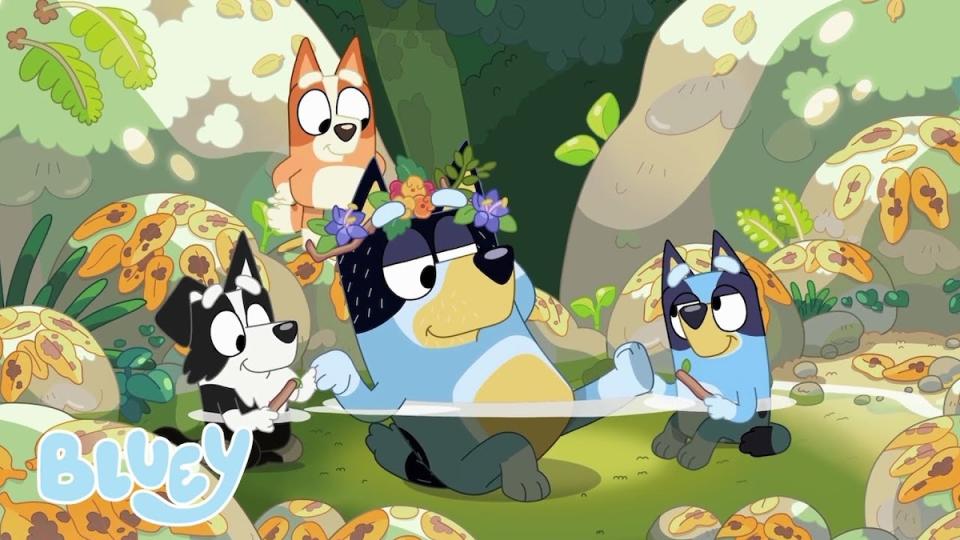
Bluey gets lots of credit for its depictions of stress and anxiety, but few shows of any genre can match it for sheer beauty. The long trek through the woods, and the magical moment the creek appears, captures the wonder of childhood exploration. Bush’s score here is some of his best work, and Bandit slots into his natural role as comic relief. It’s everything that makes Bluey special.
06. “Dad Baby” (Season 2, Episode 65)
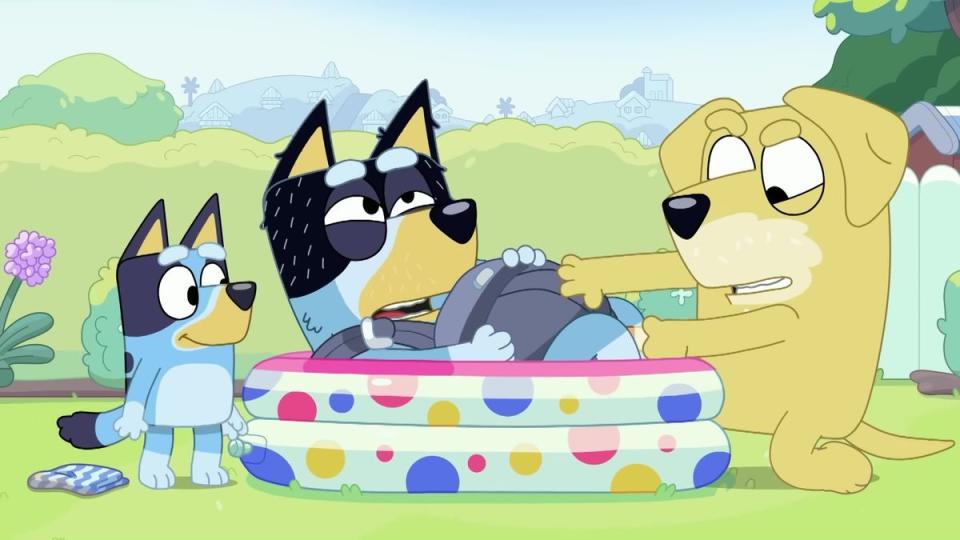
Many American Bluey watchers have heard about the episode where Bandit plays pregnant, but I’d bet most don’t realize how much Disney+ has taken from us. It’s the first episode where Wendy speaks. It’s the first time we hear that Lucky’s Dad is named Pat, and when Pat delivers this baby, he delivers his finest performance. But mostly, Disney+ has robbed moms everywhere of the most delicious and deserved schadenfreude. If you thought “The Pool” was fun, just wait until Dad’s baby starts kicking.
05. “The Beach” (Season 1, Episode 26)
The screaming children don’t quite get it, but sometimes Mum likes to walk alone. After setting off by herself down Australia’s coast, Bluey decides to follow, facing crabs, birds, and worst of all, solitude. By the end, Bluey kind of enjoys walking by herself. But is she going to give Mum more alone time? Even for a show with magic, that’s too far-fetched.
04. “Cricket” (Season 3, Episode 151)
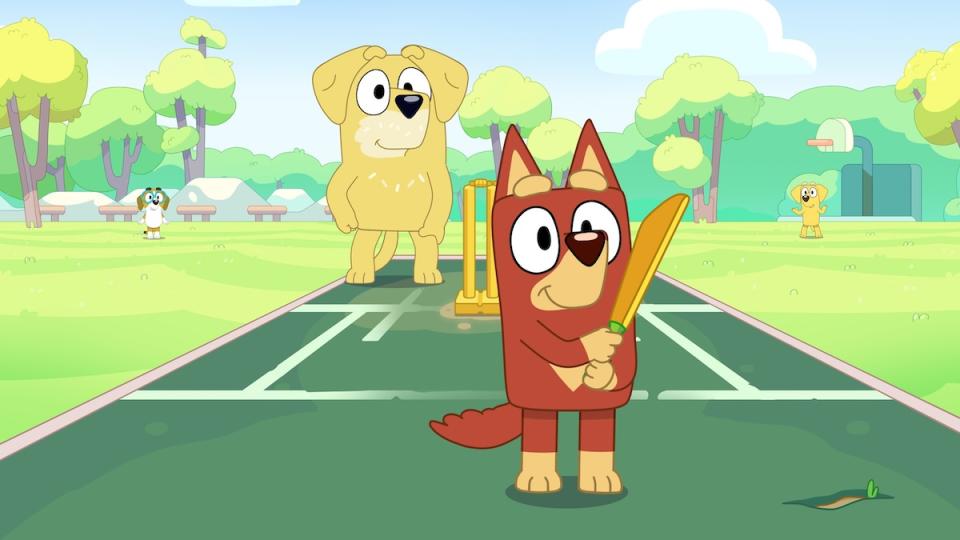
Many sports stories tread over the same few formulaic beats, but “Cricket” is legitimately surprising. I doubt a single viewer predicted Rusty’s final out, never mind that thrilling leap forward in time as he takes the field for the national team. But those moments wouldn’t elicit such cheers if “Cricket” hadn’t invested in the emotions behind the sport: Rusty’s admiration for his brother, his yearning for his dad, the support of his best mate Jack, and his hilarious, loving mom. In this episode, the people in his life powered his success as much as his challenges sharpened his resolve. It’s easy to cheer for.
03. “Rain” (Season 3, Episode 122)
“Rain” has no dialogue and not much more plot, just a Blue Heeler splashing in the rain. The pitter-patter of the musical score is simultaneously bright and soothing, like the trickle of a garden fountain. “Rain” has all the visual precision of a silent movie, and it’s a great way to wash away the day’s stress.
02. “Camping” (Season 1, Episode 43)
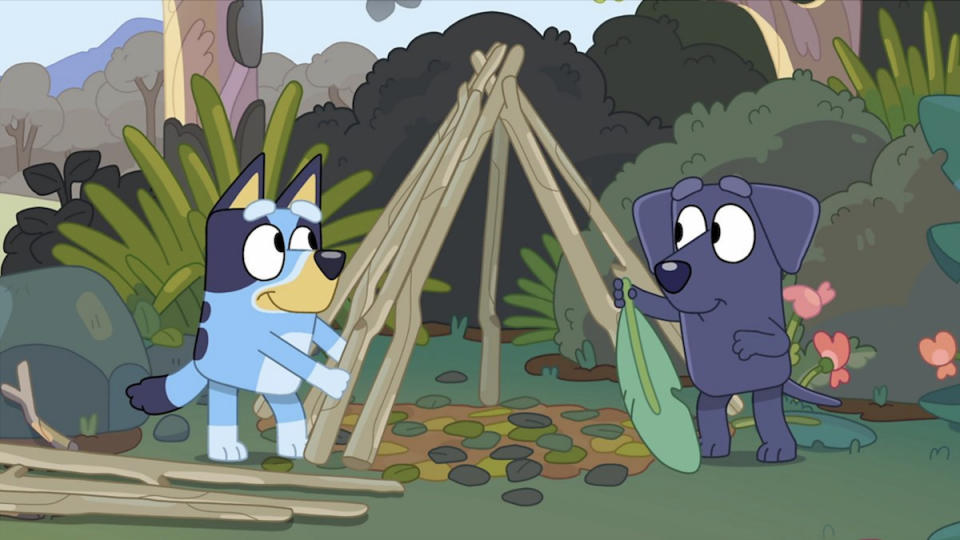
“Camping” celebrates a friendship that transcends speech. Jean-Luc (his name is one of several references to the classic Star Trek: TNG episode “Darmok) may not understand English, but he and Bluey play fluently, working in tandem to hunt down Daddy Pig. The bitterness of their parting, and Bluey’s pain, is more than sweetened with a flash forward to when Bluey and Jean-Luc unexpectedly meet a second time. All in all, it is Brumm’s most-touching ode to the power of play.
01. “Sleepytime” (Season 2, Episode 78)
“Sleepytime” is truly, genuinely stunning. Bingo’s psychedelic dreamland adventure is full of magic, while each interruption from the waking world offers us a hilarious peek at the parents’ nighttime pain. We see the stuffed animal Floppy the way Bingo sees Floppy, and we feel a mother’s love as composer Joff Bush’s grandest melody scores a blazing sun. “Sleeyptime” is humorous, touching, and a joy to watch, all combining for six minutes unlike anything else in television. May all your dreams be as sweet as these.
Thanks for reading! If you’d like, you can also check out our Bluey-themed crossword, “True Bluey,” below.
An Exhausted Parent Ranks All 154 Bluey Episodes from Worst to Best
Wren Graves
Popular Posts
